#All about the pressures of the court. Trying to make them conform.
Text
You know what's really tragic about the character of Rudolf in Elisabeth das Musical? (Besides, y'know... Everything?)
That he's a LOT like Franz Joseph too, at least when he was his age.
They're both under the thumb of one parent, who doesn't allow them to express their own political view. They both feel like intrigue is ruining their lives, and wish they weren't in the restricting position they occupy. And most importantly: they both express a desire to be "soft", instead of the hard and emotionless leader they're drilled to be.
Why then, is there no song, not a single line, where either of them acknowledge that similarity? Elisabeth and Rudolf both sing about how similar they are, why can't Rudolf and FJ?
Because Rudolf doesn't know. How could he know that his own father went through the exact same pressure he is under.. when the pressure was successful in molding him? He never sees that softer side to him.
Franz Joseph might have chosen Elisabeth over his mother in the end, but he internalized her lessons and sees them as truth. He is hard, he is strict, and he doesn't know any other way to be. He doesn't see anything wrong with how he's treating his son. (And in his childhood, how Sophie raised him). He turned out fine, why should Rudolf be different?
So Rudolf had not one, but two parents who should have been able to relate to at least part of his despair. But both failed to be the parent they wished they had. And I don't know if it's better or worse that he never even knew how his father was similar to him, too.
#I'm surprised I haven't seen much mention of this#Maybe this is a super common idea and I just haven't seen it. Or maybe it's too obvious to point out#But idk I just got sad when I connected the dots#They're even dressed the same#Poor Rudolf really got the worst cards from both his parents hands#Elisabeth#elisabeth das musical#kronprinz rudolf#Not to mention Rudolf Ich Bin Ausser Mir which uses the same melody as Bellaria and Ein Keizerin Muss Glantzen#And Unsere Keizerin Soll Sich Wegen.#All about the pressures of the court. Trying to make them conform.#Elisabeth in her fixation on her beauty (the most successful political tool she wields)#Elisabeth and FJ BOTH are pressured by Sophie specifically#And then FJ has an argument with his son. Which literally sounds similar to the argument he had with his mother.#Ofc Elisabeth reprises FJ's parts too when she rejects Rudolf's plea for help#Like he rejected hers. But that parallel is written in bright neon lights#I feel like FJ mirroring Sophie is less noticable but no less impactful#God. Circles never do stop themselves do they?#-slaps the Austrian emperial family- this bad boy can fit so much generational trauma in it
45 notes
·
View notes
Note
Hello!
I love reading your analyses. What are your thoughts on Quan Yizhen and Yin Yu?
Thank you for your ask! I'm so happy you like reading my posts, that really means a lot to me ;_;
Okay so I really like both Quan Yizhen and Yin Yu as individual characters and also their relationship, I don't know if I have anything interesting to say about them though ;A; but I'll give it a try!
First thing that comes to my mind is really how what happens with the both of them once they're in heaven is such good evidence of how toxic the work environment and the power structures up there are. Everything they already struggled with in their sect is even worse; the jealousy, the bullying, the intolerance, the abuse of power. Quan Yizhen was drawn to Yin Yu because of Yin Yu's kindness, but I think he could tell that the pressure to conform to heaven's power structures was starting to chip away at it:
Quan Yizhen kept going. "They cussed at me first. I don't even know them. They said I was a low-ranking heavenly official and yelled at me for no reason, then they laughed at me and told me to scram and not to block their way. I told them to apologize, and they wouldn't, so I beat them up. They only shut up when I beat them up, otherwise I wouldn't have hit them."
Things were considerably more peaceful in the current time*, but in the early days, some heavenly officials - from both the Upper and Lower Courts - would throw their weight around and bully lower ranked officials with less experience. Yin Yu sighed.
"Are lower-ranked heavenly officials beneath other people?" Quan Yizhen asked.
"No," Yin Yu replied.
Was that true? It was obvious that he didn't believe his own words, and Quan Yizhen noticed.
Quan Yizhen, who hasn't ascended yet, declares that he doesn't like heaven, and when Yin Yu admits to the same, Quan Yizhen suggests that they go back to the human realm. But Yin Yu is deeply caught up in what's essentially sunk-cost fallacy; because ascending to heaven was both his dream and quite hard for him, he wants to stay even though it's making him increasingly unhappy. He can't face the fact that his dream has turned out utterly disappointing.
I think they're also a good case of why it's downright impossible for individuals to change the power structures of the environment they find themselves in on their own - Yin Yu tries to conform and to get by with smoothing over conflict whenever it happens, essentially just forcing himself to endure it all quietly. Meanwhile Quan Yizhen rightfully doesn't understand why he should let himself be mistreated and pushes back, though that also essentially doesn't change their situation and only leads to more pressure being put on the two of them. From his perspective, leaving is the best choice since life in the sect, where he was simply left to train all day, was much better for him. But it's also understandable that from Yin Yu's perspective, it wouldn't be much better since he'd already been having similar problems back then with people expecting him to manage and control Quan Yizhen.
Plus, Yin Yu is very conscious of the opinions and expectations of the people around him and quite anxious to fulfill said expectations - I can imagine that he wouldn't know how to deal with his sect's reaction if he, a cultivator who had received the ultimate honor of ascension, were to reject said honor and go back to being mortal. Kind of ironic to think that once he's banished, he will start working for a ghost who did reject his own ascension.
*Minor aside, since this it's from when Xie Lian was watching those events unfold, I think it's less that things are actually more peaceful now and more that Xie Lian doesn't yet know how deeply the corruption of the heavens really runs and how bad things really are. Plus, he overall spends very little time in heaven, so I don't think we can fault him for having this impression.
Speaking of Xie Lian, I find it very telling that the ghost realm, and specifically Ghost City - the one single autonomous place within all three realms - eventually becomes both his and Yin Yu's home. I know people joke a lot about Yin Yu deserving a raise and such, but I think they forget what it actually means that he's the right-hand man of Hua Cheng, given that Hua Cheng holds so much power and influence in all three realms that he's the only one Jun Wu is genuinely wary about. That's an incredibly high position, not to mention the level of trust Hua Cheng shows Yin Yu, like in the amnesia extra when he sends him to deal with the monster that stole Xie Lian's memories. I'm going to get more into this in the Yin Yu-centric meta I've been working on though.
One thing I've been thinking on as I'm drafting this reply is that I feel what ties all four of these characters together is how their relationships started because of acts of kindness, both big and small, and the long-lasting effects thereof.
Like for Xie Lian and Hua Cheng I think no explanation is needed. Then Quan Yizhen and Yin Yu's relationship started when Yin Yu asked his shifu to take Quan Yizhen in to their sect when he met him as an abandoned child that really wanted to learn martial arts and got beaten up by adults for it. Then Quan Yizhen's friendship with Xie Lian started because when that play that very cruelly mocked Yin Yu was shown in heaven, Xie Lian was the only one that cared how upset it made Quan Yizhen and threw a chopstick to make the curtains fall.
And I feel like for Yin Yu, it might be the same with Hua Cheng, who he stays loyal to because Hua Cheng was the only one to help him and the one to take him in when all of heaven abandoned him:
"Chengzhu has shown me grace. He saved me -"
"I know," Jun Wu said. "He even helped you pacify and send off Jian Yu's vengeful spirit after he died during your banishment, am I right?"
Hua Cheng right from the start is described as someone who, despite being a Ghost King, is known to sometimes do "odd acts of kindness", and I feel that taking Yin Yu in was one of those. Because think about it - by the time Yin Yu is banished, He Xuan has already infiltrated the heavens, so there's not really any valuable Intel to be gained from taking Yin Yu with him. I can't really imagine Hua Cheng doing it just to spite the heavens either, at least not completely, since he lets Yin Yu hide his identity and apparently no one (except apparently Jun Wu) knew where Yin Yu even was for years. But I can imagine Hua Cheng coming across Yin Yu - a god banished and shackled, abandoned and mocked by all of heaven, punished essentially for someone else's choices but taking the blame regardless, accompanied only by a wrath ghost - who might that have reminded him of?
Sorry, I feel like i probably ended up talking about lots of other things than what your question was about. It's when I start thinking about the themes and stuff in this novel I can't stop ;A; Feel free to ask a follow-up question(s) if I got too off-topic!
69 notes
·
View notes
Note
Hello so I am not the trans Ophelia anon but I also have trans Ophelia thoughts to share with the class!!
I’m picturing transfemme!Ophelia, in which Laertes and Polonius are… well meaning but very concerned with making sure Ophelia is taken by the court as a Proper Woman ™ who does Proper Woman Things ™, keeps her purity, etc etc. Like, they’re so concerned with making sure that she performs femininity on their terms, because they’re convinced they know better than her what she needs to do to be happy as a woman, and to be taken seriously as a woman. But to Ophelia it’s so stifling because she never gets to like… figure out who she wants to be, from the moment she came out to them it’s been all about how they think a woman should act. And then in her head there’s this whole undercurrent of… well, if she doesn’t act as a women the way they think she should, will they believe she’s a women at all? Will anyone else? Should she even try to figure things out herself if that risks her not being taken seriously?
Act I Scene III especially — Polonius saying “You do not understand yourself so clearly as it behoves my daughter and your honour”, and Ophelia almost right after saying “I do not know, my lord, what I should think”… ow ow ow, maybe she would know what to think if you let her figure it out rather than dictating her femininity for her!!
So her acting rather submissively throughout a lot of the play is her trying her best to be a woman the way her father and brother taught her, because that’s just how a woman should be, isn’t it? If she breaks up with Hamlet then that’s just what a good woman should do, isn’t it? Then when she goes mad she’s finally like — fuck it, that’s clearly not working, she’s going to act like however she wants, it’s not like Polonius can exactly tell her off for it now.
I think this also meshes very well with any version of trans Hamlet! Hamlet and Ophelia as each other’s confidants as they start on their respective Gender Things, before Ophelia starts falling under pressure from her family and not listening to Hamlet so much anymore.
So “God hath given you one face, and you make yourselves another” is like… peak trans vibes obviously, but in the context Shakespeare probably meant of it being part of Hamlet’s critique of femininity that passage reads like… Hamlet is seeing Ophelia force herself into this really narrow, restrictive box of What Womanhood Should be that’s clearly making her suffer and he’s pushing back, he’s telling her that it won’t make her more of a woman and it isn’t going to save her. “Be thou chaste as ice, as pure as snow, thou shalt not escape calamity”… yeah. Especially in the context of transmasc!Hamlet who’s been there, done that with trying to conform to that version of femininity in his own way pre-transition and was absolutely miserable, or transfemme!Hamlet who is very much not interested in the version of womanhood Ophelia is trying to conform to and is… maybe a little wary of Ophelia trying to hold her to those standards as well.
Also transmasc!Laertes is an interesting combination with this take! Just the very complicated way that would add to their sibling dynamic. Both of them coming together for solidarity from their father and helping each other work things out, but also Laertes getting freedom in his transition in a way Ophelia just… doesn’t, whether that’s because of the respective directions they’re transitioning or because of something else about Polonius’ relationship with each of them. Laertes getting to leave home and discover himself and be told “above all, to thine own self be true” in the same conversation as Ophelia is told she doesn’t know herself… ow. We should totally just stab Polonius!
OH GOD AUGH ACK YEAH... like ophelia already has so many constraints on her behavior as a woman in the court but if she's a trans woman then there are just so many more places where she has to tread carefully to keep being seen as a Proper Woman... and ophelia trying to submit to this ideal of the Proper Woman in order to prove that she IS a woman, that she CAN perform womanhood "right," but of course trying to perform gender Right is a trap... AND IF HAMLET IS ALSO TRANS!!! IF HAMLET IS ALSO TRANS!!! IF HAMLET IS TRANS AND HAS A DIFFERENT AND PERHAPS MORE CONTENTIOUS RELATIONSHIP TO GENDERED EXPECTATIONS!!! SCREAMING PULLING MY HAIR OUT ETC. THE LAST PARAGRAPH EHRE TOO. HOOGH. ANON YOUR BRAIN ISFUCKING MASSIVE
94 notes
·
View notes
Text
[HotD] Helaena and Alicent’s Relationship: Evidence of Neglect and Abuse
CW: Domestic Abuse
Helaena is our sweet, mythic Cassandra, but in her feudal, martial, patriarchal society and in the Red Keep's court, she is likely just too “odd”.
Since she doesn’t appear to interact with anyone in court and those courtiers would have seen her mumble under her breath, playing with creepy-crawlies most of the time, she undoubtedly would have been seen as either crazy, feeble-minded, or defective. Which has interesting implications for her relationship with Alicent.
Signs of Mental/Emotional Abuse (LINK)
being emotionally upset or agitated
being extremely withdrawn and non communicative or non responsive
unusual behavior usually attributed to dementia (e.g., sucking, biting, rocking)
nervousness around certain people
an individual's report of being verbally or mentally mistreated
Traits of Abusive Behavior from Parents (LINK)
Continually ignoring or rejecting a child
Physically or socially isolating a child
Forcing a child to do things by scaring them
Exposing a child to domestic violence
Constantly criticising, humiliating or blaming a child
Constantly swearing, yelling or screaming at a child
Making a child feel different from other family members
Telling a child that they’re worthless, unloved or not enough
Withholding love, support, praise or attention from a child
Bullying, teasing, insulting or belittling a child
Having unrealistic expectations or unreasonable demands of a child
Not allowing a child to explore, express themselves, learn or make friends
Treating a child badly because of things they can’t change (eg. disability, gender, sexuality)
Threatening abuse or threats to harm loved ones or pets
Alicent's Characterization
Show!Alicent is one of the many women of the ASoIaF universe whose close family member uses their body's reproductive abilities for their own ambitions and against her will.
But Show!Alicent is the example of that woman who doesn’t resist against most patriarchal expectations and standards of moral femininity--unlike the gender nonconformists Daenerys, Rhaenyra, some of Cersei, Arya, Brienne, etc. All women who, it must be noted, dressed and/or acted outside of the norms of Westerosi standards for (noble)women even when they were children and teenagers.
Yes, even Cersei, the woman who constantly uses Lannister specialness as a way to access that martial power that men receive and direct in this world, rejects anything remotely feminine if it doesn’t lend to this access, and thus becomes blind to her own faults and weaknesses. This looks like nonconformity, but of the self-destructive and abusive kind. Yet, she also puts pressures on her own daughter, Myrcella, to conform to the patriarchal standards of femininity, which Myrcella resists.
Show!Alicent is clearly more like Cersei in this last aspect, when episode 6 shows us Alicent grabbing Aegon’s face and yelling into it about him being the challenge to Rhaenyra’s claim and how Rhaenyra will definitely kill him if he doesn’t work with/stand untied with Aemond against Rhaenyra’s children. Alicent wants Aegon to consider Rhaenyra a bigger threat than she is, and when he doesn’t she lashes out against him.
Show!Alicent is a person who demands conformity to the feudal standards of gender expression from herself and from others. She wants "perfection".
Helaena can never conform to the standards due to her visions, mumbling, fixation on bugs (before she becomes a mom but too late because everyone in court would have seen her as weird), etc. Some of us may like Helaena for basically exposing Aegon and for being the least hateful or power-seeking of all the characters, but in the context of feudalism and the environment she would have grown up in, she would be seen as just defective.
Thus, Alicent definitely can't even begin to understand her, let alone respect her boundaries. She would see Helaena as someone either needing "fixing" and try to make her act more like she strived to when she was younger. (Not that we get to see how Alicent reacted to Helaena after she had her, because of the time jumps.) That is, of we have a consistently wrotten Alicent character.
Mother and Daughter Don’t Get Along
Since we don’t get scenes of events between the 5th and 6th episodes due to the massive time jump, the audience is forced to evaluate Alicent and Helaena’s relationship in just two episodes (6 & 8). On one hand, I think is unfortunate because Alicent and Haleana get only 3 scenes together where we could have had more to better answer the questions I have about Alicent, Helaena and Aegon [II]. At the same time, I think the show also is trying to let us know that their relationship is one that is one of silent resentment and ignorance with how little to two actually speak and understand each other.
Helaena becomes a Cassandra figure in the show, where she sees future events, talks about them in language that’s more poetic than colloquial, and gets ignored by her entire family. It looks like she’s usually on her own with small objects of her interest: the small knitting kit and her bugs. Her brothers talk about her while right next to her in episode 7 while she mutters about threads and the coming civil war. Viserys is nowhere to be found near her, nor do we ever see him talk to her or about her. Otto seems much less stern, intimidating and looming towards her than he is with Alicent, but it still seems indulgent and condescending (episode 8). And Alicent doesn’t seem to really know what to do with her in any of the scenes they have together.
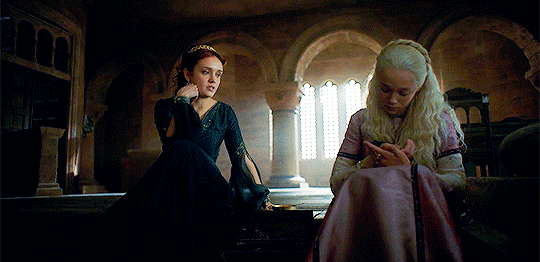
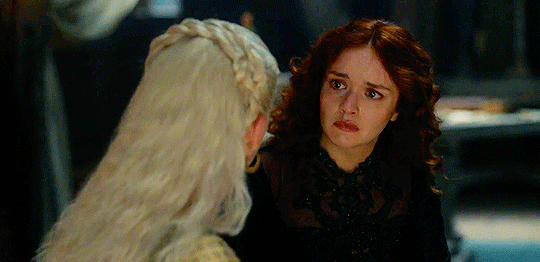
Images Credit: criston-cole @ tumblr
Phia Saban, the actress playing Helaena, plays her as at least neurodivergent and maybe autistic. And the refusals happen when Helaena is trying to tell Alicent about her visions. We get scenes where we’re made to wonder whether it’s just autism, autism and non abusive emotional distance built from very different personalities, or if it’s autism and abuse that makes Helaena refuse Alicent’s touches.
Helaena does let Alicent touch her in episode 8 when she enters Aegon’s room after Alicent lectures him for being so openly promiscuous. However, that touch recives no real reciprocation (HBO, “Lord of the Tides”, Episode 8: 24:50).
We may argue that is just an autism thing, but autism is on a spectrum of behaviors and manifestations. Not all autisitc people reject all sorts of touch.
And the reason why I think that Helaena doesn’t want Alicent’s touch specifically is because she was much more receptive to Jacaerys Velaryon in episode 8 where they dance together than she ever was to Alicent, her own mother.
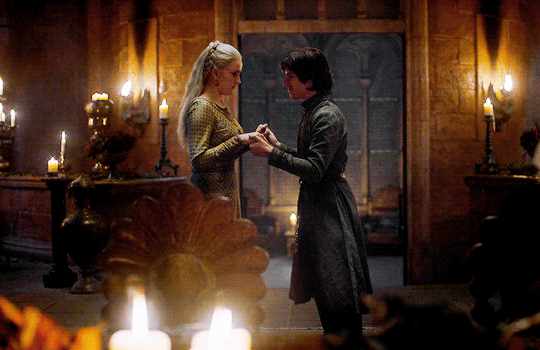
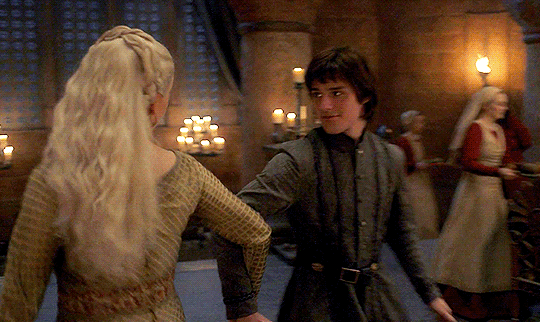
Images Credit: mercymaker @ tumblr
Helaena w/Others Besides Alicent
I don’t think that it’s just Helaena being an autistic person who experiences an aversion to touch even from family members. Because, an autistic person who does have this aversion is not going to accept touch and physical interaction form either family or almost strangers, and Jaecaerys is less family-by-blood than Alicent is. He also doesn’t appear close to Helaena and didn’t seem to have grown close in the same spaces while he lived in King’s Landing. We don’t get even one interaction between them when he lived in the Red Keep. He also has apparently been in Dragonstone with Rhaenyra and Daemon for the past years between episode 7 and episode 8, away from King’s Landing, being even physically further from Helaena than he was before.
Obviously he would have at least said some words to her or have been near her for a few hours at some point in the past, but there’s no indication that they ever spent time together openly and intimately to have grown any sort of bond. Alicent would have had much more opportunity, even with her possible household duties as a married royal/noblewoman/queen.
We don’t get to see how Helaena regards Aemond’s or Otto’s touch, but seeing as Otto isn’t much of a toucher himself and Aemond looks more focused on training with Criston and on Alicent, I doubt they have much of a strong relationship themselves. I believ that this was intentional on the part of the writers, to show only fraught interactions between Alicent and her kids. Even that moment of episode 9 where Alicent nonchalantly calls Aegon an “imbecile” for doubting her love for him we learn that aegon feels unloved and has for his entire self-aware life. There has to be a reason as to why, that sort of feeling doesn’t just appear out of nowhere. And in comparison, the show shows us that Rhaenyra’s kids and stepkids aren’t distant, scared of her, nor Daemon.
The greens however have multiple instance of that happening.
As for Aegon, they managed to produce three children (Maelor should appear by the next season), at least having sex twice to have them (Jaehaerys and Jaehaera are twins canonically. I assume that in the show they are still twins). And she had them very quickly after she married him. Plus, in episode 8, as she talked to Baela and Rhaena about the good and bad of marriage, she herself reveals that she doesn’t get to see Aegon often, implying that there is a standard of intimacy in that Aegon never met because he doesn’t work to build bonds of love between them both because Helaena is another way for him to not have a choice in when Otto/Viserys arrange their marriage AND because he doesn’t think anyone really loves him. Similar to Daemon not wanting to marry Rhea Royce but forced to at 16 for political/economic advantage of his superiors. (Digression: Perhaps they also thought that it would be good for him, since Rhea could count as an heiress.)
There is therefore a quiet loneliness with the imposed solitude there, and which I think she has learned to live quietly and ignored or side-eyed since her childhood.
Alicent’s willingness to put herself before her firstborn doesn't erase the pattern of neglect and abuse done.
#helaena targaryen#alicent hightower#alicent and helaena#asoiaf abuse#the greens#the blacks vs the greens#tw child abuse#helaena's characterization#alicent's characterization#my hotd headcanon#hotd helaena#HotD#asoiaf
13 notes
·
View notes
Text
March 26th, 2024: I Am In Control
Hello! I am so sorry I haven’t been able to write to you these past couple days, I just got busy. Actually, I’m lying! (For the sake of this entry!!) I didn’t write because I just didn’t. The reason for why may vary, but in reality, I had complete control over my actions. Taking a break of course is okay, but I take full responsibility for my actions.
Taking responsibility for your actions can be scary, or it can be freeing! The universe will throw things in your way, but if you want it, you can have it! Don’t keep telling yourself “but the circumstances…” because the circumstances aren’t in control, you are!
I’m going to talk about a classic psychology experiment in American history called the Stanley Milgram experiment. To summarize, the patient/volunteer in the study is asked politely by a figure of authority (perceived scientist in experiment) to inflict pain on an unseen actor. They were told they needed to flip the switch to give the actor an electric shock if they got an answer wrong. The experiment showed that most people will do as they were told even if they didn’t want to hurt the man anymore. Milgram has stated that 65% of the people in the study administered the heaviest voltage of 450 volts and were assumed to have killed the man behind the screen. The volunteers believed that the scientist would take responsibility for hurting this man, when really, all actions are on the person flipping the switch. Who is actually flipping that switch? Why do you listen to that man and not the man in pain? I do think there’s some problems with this, as they weren’t just doing it for fun, they were slightly pressured. But we can gather that the man would not be getting shocks if it wasn’t for the person delivering them.
I’ve seen a lot of videos in which there might be someone saying something like, for example, “I want to lose weight, but I can’t because…” but yes, you can! No it won’t be easy, but humans are made for the dirty work! If you want something bad enough, you will find a way to get there. Be a dreamer, it’s not a bad thing. Just start reasonably and set your sights high. There’s a saying that goes, aim for the sky and you’ll reach the ceiling. Aim for the ceiling, you’ll stay on the floor. Similarly, aim for the moon, and if you miss, you’ll fall upon the stars. But I’m rambling about dreams now!
Another opinion that has risen in popularity online (but has died off a little now) is that if you have mental illness you have an excuse for your actions. It reminds me of the story I tell often where this person trying to get involved with my friend group, felt it was appropriate to hit me in the back of the head, because she has D.I.D and “it was just my alter.” I do not forgive that person. One of my old friends I don’t talk to much anymore still defends this by saying it wasn’t her in control. Yes she was! Who is the one with the arms to hit me? I understand why that is being said but it’s simply not an excuse. I think of a simple thought, “if it won’t hold up in court, you are liable!” Not that the American judicial system is the most accurate… As a person who lives with bipolar disorder, if I have an emotional outburst at someone, kicking and screaming because I was the one who forgot to take my medicine; I cannot blame it on mental illness. I am not insane, I was aware of the potential risks of not taking that medicine.
I believe it makes your life easier to accept your actions as your own, and not only that, other people will find you easier to get along with because you accept when you’re wrong (or right). It’s not fun to blame someone else for something, we need honesty and self-respect. My philosophy teacher believes if we were kinder, and more true to ourselves, humans would act more honestly and kindly to others. Is it your brain causing you to conform so you will feel accepted? And is your soul telling you that you shouldn’t? Remember you are in control of your life! Think about your influences. You live your own life, and we only have proof of one!

0 notes
Note
can u make wht bobby gonna do if mc was pregnant, i bet its gonna be rlly cuteeee
🥰🥰🥰 ok, that’s pretty cute!
and i didn’t exactly write tons of pregnancy stuff with him in “pastry cuddle”, so let’s dive in!
- watch him jump around, spin you in the air in his arms, stay hours on the phone, yelling and skipping like a kid who just got a christmas ps5 because you told him you’re pregnant
- mentally doing severe mental math to see what he needs to buy every month from now to eternity
- panicking a little, even though you guys are comfortably set, financially speaking, because now he’s gonna be responsible for another life
- calming down after you cup his chin and say “bobby... relax. we got this covered”
- bringing snacks to wherever you go, no matter if a long trip or a short drive to the grocery store/work
- gifts like “fashionable” pregnancy clothes. “none of that 80′s/90′s mom gear they used to wear! you’re still a gorgeous lass and it shows!”
- on a calmer moment of the day, you’re both lying on the couch watching something, and bobby often falls asleep close to your belly
- on that note, he caresses it and talks to the baby, or babies, a lot!
- still on that melty topic, he sings to them all the time. most of the times he’ll pick a soothing melody like “over the rainbow”, “la vie en rose” or “what a wonderful world”, starting out with a louis armstrong voice, to make you laugh, then picking up on his normal and raspy tone
- foot rubs! lots of it!
- has reminders on his phone for your vitamins, drinking water timestamps, snack time, meal time etc.
- the bed has turned into a zoo of pillows, specifically for your back
- bobby now has installed ai everywhere in the house, so you don’t have to get up to do anything, even though you should
- he doesn’t let you do house chores, even though you should. “i’m pregnant, bobby, not sick. i should be contributing too!” “well... stil...” cuts to him in a flowery apron, rubber gloves on, doing the dishes while there’s food in the oven, and the house is neatly clean
- nighttime often ends up with your head on his lap and his hands either running on your hair, cheek or shoulders, to help you relax.
- MOST - PANICKY - DAD - IF - BRAXTON - HICKS - HAPPEN!!!
- and he’ll take you to the hospital, almost crying, but doing the best he can to hide his desperation. it’s not working but he’s trying!
- you will have some problems while choosing the names. believe bobby wants to know the sex so he can pick tons of stuff, but he gets lost in the choices because he doesn’t want to conform. at the same time he wants to picture his little girl in a cute fluffy dress, or the boy in a cool sleeves up shirt and a sideways ballcap.
- he’ll suggest plenty of absurd names before taking it seriously, just because he knows it relieves the pressure you must be feeling. so he’ll be joking around with marvel names, star trek characters, possibly diving into the dr. who dimension!
- expect lots of censorship when it comes to food. he’s mostly concerned about your feeding habits and will police you to not get it too extravagant.
- “i owe you for life. you’re having my kid.”
- instead of relaxing on the last month, he’ll go a little insane and practise “middle of the night” runs, kind of like marshall eriksen did, on himym. (couldn’t find a clip but he uses a watermelon and alarms to train himself in waking up promptly)
things he’ll say directly to your stomach:
“lass, do you think they know i’m their dad?” he asks while trying to listen a kick
“i’m gonna help you with the lasses. or the lads. or with none. i’m gonna love you no matter what happens.” he tears up while stroking your skin
“once upon a time there was this gorgeous princess who fell in love with the court jester. after all, he was no common fool. he was getting paid to be funny.” “yeah, he wishes.” you respond, directing his hand up and down on the bump.
once the water breaks he has everything covered. the bags with baby articles, your own with your comfortable clothes, favorite products and the most entertaining games and apps he could find to download on your phone
- “push! i mean, i’m not bossing you around, but like... push!” while the doctor furrows their brows, shaking their head.
- trembling from head to toe when holding his baby for the first time. not even noticing his tears of joy
- melting away while seeing you holding them
- sniffing constantly because he can’t help being so in love with you and your child
- “i look disgusting!” “you look beautiful, it’s what you look, lass.”
- as soon as that little piece of him grabs his finger it’s over for dad!bobby
- the first time you fall asleep with them in your arms, bobby won’t resist and will take a picture. he’ll keep that one just for him
now i’m in my feels! thanks a lot, anon! jk jk
hope this is what you were looking for!
#litg bobby#litg#love island the game#love island the game season 2#litg s2#litg season 2#fusebox#fusebox games#queue#pregnancy#dad!bobby
70 notes
·
View notes
Text

(I’m so sorry, I accidentally deleted this ask when I was trying to fix where I put the cut but here’s the image of it because I still had it open in another tab and I’ll just answer like normal. Sorry!!)
This is a great question! There are several reasons why some historians, most notably Gregory Massey, author of John Laurens and the American Revolution tend to paint the Laurens-Hamilton relationship in a more platonic light.
One of the main reasons is that in the 18th century, letters were simply much more romantic and poetic, even to close friends. Phrases and sentiments that now would be read as pretty darn romantic (Like “I love you”) were seen as acceptably platonic back then. So some of the letters between Laurens and Hamilton, particularly Laurens’s, would’ve been seen as acceptable and even normal for very close friends.
HOWEVER, there is a big problem with this argument of “it was just the language of the time” when it comes to Laurens and Hamilton.
While some of their correspondence would have been seen as reasonable for friends back then, some would NOT have been. And don’t just take that from me. Take it from John Church Hamilton. If you look at his biography of his father, you will see that much of the April 1779 letter is not included. Here’s a great rule of thumb: if someone from that time period saw it as sexual enough omit from a giant biography, that’s not “just how people wrote back then.”
The second main argument is an understandable one: Laurens had a wife when he met Hamilton, and Hamilton married Eliza while he and Laurens were still in their relationship. Which, if you don’t look closely at the circumstances around the marriages seems like a pretty good argument.
But let’s take a look at those circumstances, shall we?
John Laurens received a letter from Francis Kinloch (a probable male lover) around early May 1776, which happens to be nearly nine months before John’s child, Frances, was born. So his relations with Martha Manning, John’s eventual wife, could have possibly been to make John feel better about the break-up.
And it is extremely important to note the social pressure going on. Being openly gay was not an option. So courting Martha (they were friends/possibly courting before the baby,) could easily have been just trying to conform to social standards.
The marriage was also not about love, really. And John pretty much admitted this in a letter to his uncle. He wrote, “Pity has obliged me to marry.” This was because Martha was pregnant, and having a baby out of wedlock was extremely taboo. (I mean look at Hamilton, he had to deal with that stigma his whole life.)
If John really did love his wife, I also would think that he would have wanted to stay for his daughter’s birth. He left shortly before she was born, and once he was in America, put them pretty much out of his mind. There were plans to bring them to America, but it never worked out. And John seemed pretty content to just have them be in England. “The wife and child left behind in England seemingly occupied little space in John’s thoughts.” says John Laurens and the American Revolution by Gregory Massey.
But what about Hamilton? Didn’t he love Eliza Schuyler?
Yes. But just because Hamilton loved Eliza does not mean he didn’t love Laurens as well. And this is because of the simple fact that gay and straight are not the only sexualities. Hamilton loved a woman. Using this to argue he couldn’t have loved and been in a relationship with a man is both offensive and illogical.
But a more solid argument that historians use is that Hamilton did marry Eliza during his ‘friendship’ with Laurens. Why would he pursue Eliza if he loved Laurens in the same way?
Why, I am delighted you asked!
Firstly, Hamilton was probably polyamorus, meaning that he wanted and had no trouble having relationships with multiple people. In other words, marrying Eliza did not mean that he would stop loving Laurens. He had room in his heart to love both in a romantic/sexual way.
The way Hamilton writes to Laurens about his engagement and marriage is also indicative of his trying to make clear to Laurens that even though he was getting married, he and Laurens could continue to be lovers. He told Laurens, “In spite of Schuyler’s black eyes, I have still a part for the public and another for you.” That Hamilton is stating that his love for his soon-to-be-wife would not interfere with the bond he and Laurens shared seems to be a pretty clear “I’m not going to break up with you because of my wife don’t worry.” He also talks of Eliza in a slightly cold way at first, saying that, “She is a good hearted girl who I am sure will never play the termagant; though not a genius she has good sense enough to be agreeable, and though not a beauty, she has fine black eyes—is rather handsome and has every other requisite of the exterior to make a lover happy. And believe me, I am lover in earnest, though I do not speak of the perfections of my Mistress in the enthusiasm of Chivalry.”
This is in quite a contrast to his gushy letter to Eliza about how “Neither time distance nor any other circumstance can abate that pure that holy that ardent flame which burns in my bosom for the best and sweetest of her sex.”
And then there is the next letter where Hamilton mentions his upcoming marriage.
The threesome letter.
So. Hamilton writes to Laurens on Sep. 16, 1780, “I would invite you after the fall to Albany to be witness to the final consummation. My Mistress is a good girl, and already loves you because I have told her you are a clever fellow and my friend; but mind, she loves you a l’americaine not a la françoise.”
The final consummation refers to the first time having sex after marriage. Hamilton is inviting Laurens to this event.
Anyway, this again reads to me like Hamilton saying to Laurens that the two relationships, (him and Eliza, and him and Laurens) were not exclusive. Even maybe that he believed they would work together well.
And then of course there is the truth that having a same-sex relationship in the 18th century was simply a very difficult thing to do. Hamilton and Laurens either had to keep it an absolute secret, or blindly trust that the people who did know would keep it secret. And it would have been emotionally tolling to keep this huge part of their lives a secret.
And that is all true. But that also doesn’t erase the evidence of their romance. It was hard to be in a same-sex relationship in the 18th century, but that doesn’t mean Hamilton didn’t write the April 1779 letter. That doesn’t mean Laurens didn’t tell Hamilton about his wife... ever! (Hamilton did find out, though. But not for more than a year.) That doesn’t mean that Hamilton didn’t invite Laurens to “the final consummation.”
Then there’s the problem that queer history just wasn’t written about in older biographies, which are sources usually used by current biographers. So you have to go to the primary sources, like the letters. And once you find the primary sources, you have to do extra analysis, because in the 18th century Hamilton couldn’t have just said, “John Laurens, I love you so much. I love you like I love my wife, and do you remember how awesome the nights we spent in the same bed were?” It was all carefully disguised, under the pretense of “brawdy humor” and “sentimental language.” Plus, letters that may have contained more explicit things are missing/destroyed. Many argue that “it was the language of the time” without considering that it was extremely dangerous to write things unacceptable for the language of the time.
But also there is a sort of double standard that is used. And I’m going to use the example of Angelica Schuyler and Hamilton here. Angelica and Hamilton definitely had a flirtatious relationship, but I find it hard to imagine Angelica seriously going after him, since she and her sister had a close bond. And yet many people accept that they loved each other romantically— emphasized in the musical Hamilton, wherein a lot of time is spent on an errant comma in a letter, and no time is spent on Hamilton bragging about his ‘nose’ in a letter to John Laurens. (I know I defend the musical a lot, but this is something that bugs me.) So the point is, it takes very little evidence to be able to claim “love” for possible straight relationships but takes nearly absolute confirmation for a queer relationship to be considered at all.
There’s also possible homophobia from the writer of the history. This isn’t to say everyone who thinks Hamilton/Laurens were straight is a homophobe, not at all. But if someone has prejudices against LGBTQ+ people, they might just not consider the the relationship could have been romantic... it might not be something they’re tuned into as a valid part of history.
There are others I’m probably forgetting so if anyone wants to add please do. But I think this covers most of the main reasons.
Thank you for the great question, it is always important to look at the other side of the issue! I hope this helped you.
(And no, no one’s asked this before!)
#ask#not anon#John Laurens#Alexander Hamilton#Martha Manning#Francis Kinloch#I guess I mention him#history#queer history#I'm sorry about accidentally deleting the ask#Angelica Schuyler#letters#Eliza Hamilton
148 notes
·
View notes
Text
America’s Pre-Stonewall Queer Rights Movement
We talk like the 1969 Stonewall Riots came out of nowhere, and in some important ways it did as it upended the gay rights movement that had existed. It rejected the respectability politics of prior efforts. We were no longer trying to say we’re just like you, please treat us nicely. Post-Stonewall we were radical and demanding rights, legal reforms and power. However, the steps prior to Stonewall were important as it showed LGBTQ people exist and helped people start getting organized, building networks and methods of communication that could be used after Stonewall
———————————————————————
A lot of queer people lived in small towns and farming communities and felt like they were the only one. Then they were drafted into the military and fought in World War II and found each other.
Upon returning home from war, they were under a great deal of pressure to marry and conform to a conservative lifestyle. Most did but they still looked for opportunities to meet others and many upstanding men in their communities would go to certain bathrooms or parks to cruise (finding other men for sex) and then return home to their respectable life afterwards. They were out to satisfy a need and if the cops ran a sting, they slinked out shamefully, and feared their name being reported in the newspaper for that could destroy their life.
The United States government was scared of the Communists and called that threat the Red Scare. Related to this is the Lavender Scare, which is the belief that queer people would be susceptible to being blackmailed and so it was important to remove them from positions in government, business, & society. Many cities passed laws that further marginalized queer people. But not everyone took this meekly, they started organizing to try to fight back.
———————————————————————
1945 - World War II ends
1947 - Vice Versa, the first American lesbian publication, is written and self-published by Lisa Ben (real name Edith Eyde) in Los Angeles. Lisa Ben is an anagram of “lesbian.” It survived 8 months and published 9 issues. Vice Versa's mix of editorials, short stories, poetry, book and film reviews and a letters column, a pattern subsequently followed by many queer publications.
1950 - The Mattachine Society is the first national gay rights organization formed after WWII. They coined the term homophile (to be used instead of homosexual which feels so clinical and often used as a diagnosis of a disorder), and when asked to speak about what is a homophile, they talked about love instead of sex. At the time, LGBT people were regularly described as deviants and having mental issues, frequently portrayed as villains in the movies, often were homeless & sex workers as a result of being kicked out of their homes. The Mattachine Society fought to change that perception by portraying LGBT people as respectable citizens. The society went into decline in the mid-1960′s and disappeared after Stonewall for seeming too stuffy and unwilling to be confrontational.
1952 - "Spring Fire," the first lesbian paperback novel, was published and sold 1.5 million copies. It was written by lesbian Marijane Meaker under the false name Vin Packer.
1952 - Christine Jorgensen becomes the first widely-publicized person to have sex reassignment surgery, in this case, male to female, creating a world-wide sensation. This was performed in Denmark, and upon arriving in the USA, her transition was the subject of a New York Daily News front-page story, making her a celebrity. She published an autobiography in 1967
1952 - Several members of the Mattachine Society formed a separate society called One, Inc. They published ONE magazine, a monthly magazine and the first U.S. pro-gay publication. The US Post Office declared it obscene and refused to deliver, but it was sold at newstands in LA. ONE existed until 1965.
1953 - The Diana Foundation was created in Houston and is still in existence, making it the oldest continuously active gay organization in the United States. The Diana Foundation is focused on assisting and supporting the needs of the gay community, by distributing funds to organizations that are dedicated to providing services that enhance the lives of individuals in the community.
1953 - President Eisenhower signs an Executive Order banning anyone identified as threats to national security--including those with criminal records, alcoholics, and “sex perverts”--to be excluded or terminated from federal employment. It's estimated 5000 employees were let go, and this number does not include the many who were not hired as questions about their sexual orientation were found during background checks. This ban extended to all subcontractors who want to do business with the federal government, like Boeing, IBM, and many other businesses.
1955 - Dissatisfied at the lack of women voices in the Mattachine Society, the first lesbian rights organization in the US, The Daughters of Bilitis, was founded. It was originally meant to be a social alternative to lesbian bars, which were subject to raids and police harassment. As the Daughters of Bilitis gained members, they shifted their focus to supporting women who were afraid to come out by educating them about their rights and about gay history. They held national conventions in Los Angeles every 2 years from 1960 to 1968. Their 1962 convention was covered by local TV channel WTTV, making it the first American broadcast that specifically covered lesbians.
1956 – The Ladder, the first nationally distributed lesbian publication in the United States, began publication. It was published monthly from 1956 to 1970, and every other month in 1971 and 1972. It was the primary publication and method of communication for the Daughters of Bilitis. A big part of it’s end was debate over whether to remain aligned with other homophile groups or to join the National Organization for Women and their fight for women’s rights.
1956 - Dr. Evelyn Hooker presented her work that disproved the diagnosis that being gay is a mental illness. She conducted psychological tests of gay individuals who were not incarcerated and also were not psychological patients. Her work was met with incredulity, but she continued her work and published several additional studies over the coming years.
1957 - The word “transsexual” is coined by U.S. physician Harry Benjamin to refer to people who have a gender identity inconsistent with their assigned sex and desire to permanently transition to the sex or gender with which they identify, usually through medical means (hormones & surgery)
1958 - The US Supreme Court ruled against the US Post Office for refusing to allow ONE magazine to be delivered by mail simply for having stories and poems about lesbian and gay characters. This is the first US Supreme Court ruling to deal with homosexuality
1958 - The first gay leather bar in the United States, the Gold Coast, opened in Chicago
1961 - in San Francisco, José Sarria became the first openly gay candidate in the United States to run for public office, running for a seat on the San Francisco Board of Supervisors. Sarria almost won by default as there were fewer than 5 candidates for the 5 open seats, but city officials recognized this and on the final day had gotten more than 30 candidates registered. Sarria lost but won enough votes to create the idea that a gay voting bloc could wield real power in city politics
1961 - the Tay-Bush raid, the largest raid on a gay bar in San Francisco, resulted in the arrests of 103 people. It is considered a pivotal event in the history of LGBT rights in San Francisco.
1962 – Illinois becomes the first U.S. state to remove sodomy law from its criminal code, but it criminalized acts of "Open Lewdness,” such as open displays of affection between people of the same sex
1962 - The Janus Society was founded in Philadelphia. It is notable as the publisher of Drum magazine, one of the earliest gay publications in the United States and the one most widely circulated in the 1960s. The Janus Society focused on a strategy of seeking respect by showing the public gay individuals conforming to hetero-normative standards of dress at protests.
1962 - In San Francisco the Tavern Guild, the first gay business association in the United States, was created by gay bar owners as a response to the Tay-Bush raid and continued police harassment and closing of gay bars
1962 - A panel of 8 gay men had 90 minutes on a New York radio station to talk about what it was like to be gay. They talked about their difficulties in maintaining careers, the problems of police harassment, and the social responsibility of gays and straights alike.
1964 - the first organized protest against gay discrimination took place in New York City. 10 people picketed in New York City to protest the armed forces’ anti-gay discrimination and the army’s failure to keep gay men’s draft records confidential. These brave people stood up and spoke out at a time when very few were willing to do so because they did not want to be identified for fear of their family's reaction and the likely loss of their job and housing.
1964 - Life magazine published the article "Homosexuality In America" which was the first time a national publication reported on gay issues. The article described San Francisco as "The Gay Capital of America." This resulted in a big migration of gays to the city.
1964 - the Council on Religion and the Homosexual was the first group in the U.S. to use the word "homosexual" in its name. It was a San Francisco-based organization founded for the purpose of joining homosexual activists and religious leaders. It held an event where local politicians could be questioned about issues concerning gay and lesbian people, including police intimidation. The event marks the first known instance of "the gay vote" being sought.
1965 - Frank Kameny & Jack Nichols led the first “homosexual rights” protest at the White House. They wanted equal treatment of gay employees in the federal government, the repeal of sodomy laws, and the removal of homosexuality as a mental disorder in the American Psychiatric Association’s manual of mental disorders. 10 men & 3 women bravely picketed, and were covered by ABC, UPI, AP, Reuters, and other news organizations.
1965 - Inspired by the picket at the White House, on July 4th 39 conservatively-dressed people were part of a protest called “Reminder Day” held in Philadelphia at the Liberty Bell to point out that gay people are denied the rights of “life, liberty, and the pursuit of happiness”. This picket was done on July 4th for 5 years in a row. The last time just a week after the Stonewall Riots.
1965 - Vanguard was created, an organization of LGBT youth in a low-income San Francisco district. It is considered the first Gay Liberation organization in the U.S. which encouraged gays & lesbians to engage in radical direct action, and to counter societal shame with gay pride, such as by coming out to family & friends
1966 - The New York Mattachine Society stages a "Sip-In" at Julius Bar in New York City. New York liquor laws prohibited serving alcohol to gays. While unsuccessful that day in getting served, the publicity helped get the law changed.
1966 - Riot at Compton's Cafeteria in San Francisco - Compton’s became a regular hangout for drag queens, trans individuals, and young gay street hustlers, including many who belonged to Vanguard, much to the chagrin of it’s owners. The gay bars didn’t allow them in due to transphobic policies. One night management was fed-up by the noisy crowd at one table and called the police. When a cop attempted to arrest a transgender woman (cross-dressing was illegal), she resisted by throwing coffee at the police officer. It was followed by drag queens pouring into the streets, fighting back with their high heels and heavy bags. In the aftermath of this, the city of San Francisco began treating trans people as a community of citizens with legitimate needs instead of simply as a problem to get rid of.
1966 - In Los Angeles a coalition of Homosexual organizations organized demonstrations for Armed Forces Day to protest the exclusion of LGBT from the U.S. armed services. The 15-car motorcade is sometimes called the nation's first gay pride parade
1966 - National Transsexual Counseling Unit was formed in San Francisco, the first transgender organization ever, this is one action taken due to the Compton’s Cafeteria riot.
1966 - The Society for Individual Rights opened America’s first gay and lesbian community center in San Francisco
1967 - On New Years Day at the Black Cat Tavern in Los Angeles, the balloons dropped at midnight, auld lang syne was sung and some bar patrons kissed, then at five minutes after midnight, 12 plainclothes policemen began swinging clubs and pool cues, dragging patrons out the door and into the street. Sixteen people were arrested that night—six of them charged with lewd conduct (otherwise known as kissing). The raid prompted a series of protests that began on 5 January 1967, organized by P.R.I.D.E. (Personal Rights in Defense and Education). It's the first use of the term "Pride" that came to be associated with LGBT rights.
1967 - The Advocate, an American LGBT-interest magazine, was first published as a local newsletter by the activist group Personal Rights in Defense and Education (PRIDE) in Los Angeles. It began as a way to alert gay men to police raids in Los Angeles gay bars.
1967 - Craig Rodwell opened the Oscar Wilde Memorial Bookshop in New York City, the first bookstore in the country focused on literature by gay and lesbian authors. Rodwell was also vice president of the Mattachine Society and the bookstore doubled as a community center.
1967 - The Student Homophile League at Columbia University is the first institutionally recognized gay student group in the United States.
1969 - Stonewall Riots
37 notes
·
View notes
Note
hello ms. mariacallous! if you feel up to it, would you mind sharing your take on the ruling of the keira bell case in the uk/minors' ability to give informed consent for puberty blockers? i always love reading your posts and would really value reading your perspective on the case! thanks and i hope you have a good night! (and a belated happy birthday as well!)
First of all, thank you! I appreciate your kind words :)
I’m...conflicted.
Because I very firmly believe in working with people (and, specifically, since this is the topic, people who are questioning their gender identity), and helping them to make the best decisions for themselves and their lives. So I’m concerned that this will add further obstacles and frustrations to an already very difficult and not-quick path for people.
I’m also not necessarily in disagreement with the UK High Court’s ruling - I do think that it would be not particularly easy to be able to get truly informed consent from young people (10 years to 16 years, since that’s the age range in question) in situations like this, but I don’t think it’s impossible, and I think it’s where the screening and working with an individual comes in, and helping to see where they are at. I don’t think that there’s anything inherently wrong with, to use Keira Bell’s situation, 3 one-hour sessions with a psychologist/therapist before getting a prescription for puberty blockers - because that’s not the beginning of nor the only step in the process.
I’m frustrated because of how the phrase “informed consent” is thrown around, and by the fact that part of the issue is essentially how much the Tavistock and Portman NHS Trust was willing to work with and go along with what the patients wanted, and with how that’s being painted as “NHS clinic is transing your children”
I’m irritated that one of the things that gets touted - “you are the best expert on yourself” and “you should have control over your body” is once again being qualified and, in some ways, potentially curtailed.
I’m sad at the comment of Mrs. A with the 15 year old waiting for transition services who said she wasn’t afraid of her child transitioning but of that child “getting it wrong”, and that they felt there was so little “exploration of why a child might be feeling they were the wrong sex before puberty blockers were given” because I think that there is probably some truth to that but I think that, as with Keira Bell, not enough support and guidance seem to have been given. And now all the other parents and children who are or have been getting services and how they must be feeling.
I’m angry at the crowing of a lot of transphobes and right-wing people, and the invoking of “this is actually about protecting vulnerable children” because in many cases these are the same people who have no care or support for other identities and sexual orientations, and at how this will make people more afraid and hostile.
I’m reminded of how fundamentally lonely it is to be trans, or to question your identity, and of the intense pressure to conform and to hide, and the intense identity and self-value issues at play, and the trauma and the re-traumatizing. (My heart does go out to Keira Bell and to the 15 year old and to detransitioners, because they’ve not only experienced that loneliness (and likely still do) but had to confront some even more uncomfortable situations, and who hadn’t been heard or supported, and who, in all too many cases, still aren’t. To try to explore and identify a certain image, to have invested so much of your self and your life, only to feel like it was a failure or the wrong option? That’s devastating.)
I’m sad and worried for the numbers of teenagers who are hearing this and who are even more hesitant or afraid of trying to question and figure themselves out and the message they’re being given about this. Or to those who have already been pursuing things and who will now feel even more pressure and stress.
I’m weary about how the one-size-fits-all framing and approach to transitioning is being applied again, and how that framing and approach, in many ways, is the ultimate issue, and the emphasis on essentially getting as close to a cisgender/binary identity and role as possible, and how not particularly flexible it is in regards to people who are more comfortable being genderqueer, for example.
I’m dreading the inevitable round of discourse that will be kicked off and how soon JKR will be involved.
18 notes
·
View notes
Note
All of F, O, I, R, and E for Ffoirre :3 @mystery-salad
hey, thanks for the ask! :)
F
1) what do they do for fun?
he spends time with the fern hounds or goes out for a drink with Efalynn when they can. I also think Ffoirre would really enjoy cross stitch or crochet (some kind of fibre art) if he ever tried it. not that he would though; he wants to improve his reputation but he still wants to be at least a bit intimidating
2) what is their ideal party?
one that he doesn't need to go to? or something small with just his close friends
3) who would they have the most fun with?
obviously he has the best time with Efalynn because she's the only one of my OCs that Ffoirre knows, and they do get on really well. but I also think he'd enjoy fighting things with Thora, and Sasha and Krett would get him to lighten up just a little
4) can they have fun while conforming to rules?
he can, but sometimes it can get a bit boring. he was a Courtier after all, even if he's trying to put that behind him
5) do they go out a lot?
not really. usually either Ffoirre or Efalynn is busy, and he dislikes getting recognised as one of the Nightmare Court, which happens pretty often whenever he goes out
O
1) are they optimistic or pessimistic?
definitely pessimistic
2) are they openly optimistic pessimistic, throwing it on others?
yep. he has a pretty cynical view of the world and rarely sees the point in keeping it to himself
3) are they good at giving advice?
occasionally. if he lets himself be a little less cynical for a bit, Ffoirre gives surprisingly good romantic advice for someone whose most romantic relationship was a one sided crush on Gavin
4) is there anyone in their life that throws optimism on them?
Efalynn -- it's one of the main reasons why they're friends
5) were they always optimistic pessimistic?
yes, but not nearly as much as he is now
I
1) what is their sexuality?
Ffoirre is arospec gay
2) have they ever questioned their sexuality?
not really, sexuality isn't really important to sylvari and honestly he had bigger things to worry about. he's secure in his attraction to men and doesn't feel like he needs to think about things further
3) have they ever questioned their gender?
same as above honestly
4) would/was their family be ok with them being LGBT?
yeah, since sylvari have such a chill view on it (although he doesn't really consider them family. also fwiw none of my OCs will ever face discrimination/hate for being LGBT, it's not something I want in my version of Tyria)
5) how long would/did it take for them to come out?
it would take Ffoirre a while to come out to anyone new, since he needs to build up a good relationship with them first which is uh. Difficult for him. but he doesn't make a big deal out of it at all, it's probably just dropped into conversation casually when he's comfortable enough to talk about romance
R
1) do they follow rules?
he works for the Pact as part of his "rehabilitation" so yes, he has to. but like in F4, he's not always happy about it, especially if he thinks the rules or orders he's been given are stupid
2) would they be a strict or laid-back parent?
Ffoirre does not want kids, but if he had them he'd be pretty laid-back. he felt like the Pale Tree put a lot of pressure on all the young saplings, including himself, which is what pushed him to join the Nightmare, so he would be very worried about making his kids feel the same way
3) have they ever faced consequences for breaking a rule?
Efalynn actually helped the Wardens in Caledon Forest arrest him once when he was still an active Courtier. it didn't last long
4) have they broken any rules they now regret breaking?
he regrets joining the Court, if that counts. (but not entirely)
5) do they find any rules they/others follow absolutely ridiculous?
some of the conditions Ffoirre has to follow to work with the Pact are very frustrating for him. for example, he's not allowed to take night watch, and he gets very little privacy to stop him "planning things". he's not going to plan anything, he genuinely wants to make reparations, but it's incredibly irritating when they treat him more like a prisoner
E
1) does the way they do things portray their internal personality?
sort of? like I say below (see E5) Ffoirre sometimes acts like more of a dick than he really is, and he also makes an effort to Do The Right Thing (occasionally). but typically he doesn't like playing nice. (rarely though he is genuinely kind, especially to dogs, but You Did Not See That)
2) do they do things that conform to the norm?
from the standpoint of a Pact Soldier, mostly? he does the same work as everyone else, minus a few smll differences (see R5). but a lot of the time he'd rather do what he wants than follow the crowd
3) do they follow trends or do their own thing?
he absolutely does his own thing. his reputation is important to him, but not nearly so important that he'd change the way he dresses or the things he does in his free time, for example
4) are they up to date on internet fads?
obviously the internet isn't a thing in Tyria, but there's still trends and celebrity culture. Ffoirre doesn't bother keeping up with most of them, he thinks it's all a waste of time, but he does like to keep up with the ridiculous rumours people will spread about The Commander, just to tease Efalynn about them
5) do they portray their personality intentionally or let people figure it our own their own?
I think Ffoirre slightly exaggerates the less pleasant parts of his personality, especially when he's in a bad mood. he doesn't like a lot of people, and sometimes when they're so sure he's an asshole, it feels easier to play to their expectations than change their minds. but mostly he lets people figure it own on their own, they can come to their own conclusions.
#sorry this took so long i've been super busy and some of these were harder to answer than I expected tbh#i hope my answers aren't too confusing or conflicting?#my boy is Complex#i don't want to make him too much of a dick. he's still EX-court. but he's not nice either#ffoirre#guild wars 2#gw2
1 note
·
View note
Text
The Forgotten Tale of the Confederate Spies Who Invaded Vermont
In 1864, Southern soldiers plotted to take tiny St. Albans, rob its banks, and change the course of the Civil War.
— By Michael Tougias | July 16, 2021 | Boston Globe Magazine
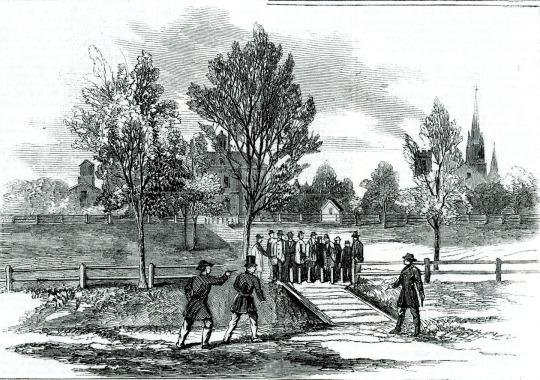
Captives, including students from St. Albans Academy, under guard by Confederate raiders. FROM THE VERMONT HISTORICAL SOCIETY
ON OCTOBER 10, 1864, Bennett Young stepped off the train from Canada, and into the train depot at St. Albans, Vermont, 15 miles south of the border. Young, a handsome, clean-shaven 21-year-old divinity student, took a room at the Tremont House on Main Street and spent the next few days familiarizing himself with the town. But Young was not what he seemed. He was a native of Kentucky, not Canada, and a Confederate officer recently escaped from a prisoner-of-war camp. He was here in this bustling railroad center of about 4,000 residents to change the course of the war.
It had been fewer than five days since Young received a message from C.C. Clay Jr., a former US senator from Alabama. Clay, sent to Canada in 1864 by Confederate President Jefferson Davis to build a network of secret agents, had written: “Your suggestion for a raid upon the most accessible towns in Vermont, commencing with St. Albans, is approved, and you are authorized and required to act in conformity with that suggestion.”
Davis himself had approved the bold series of raids. The South was clearly losing the Civil War. Atlanta had fallen to General William T. Sherman a month earlier. General Ulysses S. Grant’s forces were hounding Robert E. Lee’s Army of Virginia. The port of Mobile, Alabama, had been blockaded by Rear Admiral David Farragut. The hope was that several dramatic raids from Canada into the North would at the least force Union troops north to defend the border, easing pressure on Lee. If Union troops chased the raiders into Canada, it might help draw neutral Canada and Great Britain into the war on the side of the Confederates. And if things went really well, it might demoralize Northern voters so much that they would elect a Democrat as president instead of the Republican incumbent, Abraham Lincoln. Plus, the Confederacy needed cash.
Over the next nine days, some 20 more men from Canada arrived in groups of twos and threes. Like Young, they were also Confederate soldiers posing as Canadian civilians in St. Albans for business or relaxation. These men, only two of whom were older than 30, made polite inquiries about horses they could rent and guns they could borrow for a bit of hunting. Some took day trips to nearby towns, to play out the ruse and scout other targets to raid. Others wandered into the town’s banks, striking up conversations with the locals or inquiring about the price of gold. Their real interest was determining how many employees each bank had. Some occasionally met with Young clandestinely at his hotel, to share information and discuss the outlines of their mission.
Young, meanwhile, played his part with flair. He courted a woman staying at his hotel, impressed the villagers with his conspicuous Bible reading, and visited the home of the governor of Vermont, railroad magnate J. Gregory Smith. Smith was in Montpelier at the time, so his wife, Ann Eliza Smith, showed Young around the grounds. She thought Young “a nice mannered man,” not realizing he intended to burn the mansion down as retribution for the burning of Southern governors’ mansions.
Young had determined two potential escape routes for the bold plan, which would turn out to be the northernmost action of the Civil War. But he also saw a threat: Just a couple of blocks west of Main Street was a busy railway station and foundry, employing dozens of men who might leap into action. Still, he was confident — the raiders were going to need 30 minutes, at most, to rob several banks, torch the town with bottles of an incendiary liquid called Greek fire, and run. In the commotion, Young hoped to also set fire to the governor’s mansion, then raid Swanton, another town, on the way back to Canada.
He fixed Wednesday, October 19, as the day of the attack.
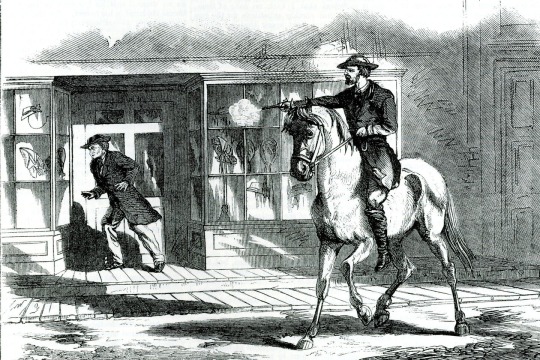
A Confederate raider shoots at E.J. Morrison outside Miss Beattie’s Millinery on Main Street in St. Albans.FROM THE VERMONT HISTORICAL SOCIETY
AT 3 P.M. ON THE 19th, St. Albans’ church bells rang to mark the hour. Under leaden skies that threatened rain, Young strolled down Main Street, then climbed a couple of steps onto a hotel porch. Reaching inside his coat, he pulled out his Navy Colt revolver and raised it over his head. “I’m an officer of the Confederate Service,” he shouted. “I am going to take this town and shoot the first person that resists!”
At first, St. Albans residents within earshot thought Young was joking. They stared at him until he pointed his gun at them and other raiders herded them onto the village green. Other Confederates went to get horses, and three groups of them headed to the town’s banks: Franklin County Bank on Main Street, St. Albans Bank at the corner of Main and Kingman, and the First National Bank on Fairfield. They were barely more than a block apart, all near the town common.
Young climbed on a horse and trotted up and down Main Street, overseeing the roundup of prisoners and monitoring his men’s assault on the banks. He knew his two revolvers had only six shots each, and would be difficult to reload while on horseback. So whenever he saw someone emerge from a building, he’d point his gun at them and tell them to get back inside, intimidating them before they made trouble.
Collins Huntington, though, on his way to pick up his children from school, ignored Young’s threats, thinking he was drunk. Young leveled his revolver and shot at him, inflicting a glancing wound along Huntington’s rib cage.
Inside the Franklin County Bank, a cashier saw a neatly dressed man named William Hutchinson approach the counter. Assuming Hutchinson was a customer, the cashier, Marcus Beardsley, asked how he could help. Hutchinson pulled a revolver from his coat. “We are Confederate soldiers,” he said. “We have come to rob your banks and burn your town. There are a hundred of us here. You must keep quiet and hand over all your money.”
A customer nearby made a run for the door but stopped when the raiders threatened to shoot. Two raiders pushed him into the vault, then began filling their haversacks with bills. Hutchinson, meanwhile, told Beardsley to give him the money from the counter, then locked Beardsley in the vault, too. The four raiders left the bank with approximately $70,000, the equivalent of about $1.2 million today.
Down the street in the St. Albans Bank, Cyrus Bishop stood, terrified, as raiders on either side of him pointed revolvers at his head. “If you make any resistance or give any further alarm, we’ll blow your brains out,” one told him. One of the raiders pointed his pistol at an assistant cashier and told him, “Not a word out of you. We are Confederate soldiers, we have come to take your town, we shall have your money.”
Then the raiders took the time to do something unexpected: They made Bishop and the assistant cashier swear allegiance to the Confederate States of America. While three more raiders entered the bank and stuffed as much money as they could fit in their pockets and satchels, one of the Confederates guarding the two bank employees lectured them on the destruction of the South by Generals Sheridan and Sherman.
The cashier was having none of it. He said if the robbery was an act of war, he should be allowed to take an inventory so that the bank could be reimbursed by the federal government. “Damn your government, hold up your hands,” hissed the raider.
At that point, someone knocked on the bank’s front door, which the rebels had locked behind them. One of the raiders opened it. In walked Samuel Breck, a merchant looking to make a deposit. A rebel grabbed him by the collar with one hand, pressed a revolver to his head with the other, and said, “I take deposits.” He took $393 from Breck and shoved him in the room with the two bank employees.
Suddenly, the sounds of gunfire erupted outside the bank, and three of the raiders ran out. The last two raiders left the bank more slowly, walking backward with their guns raised. They had been in St. Albans Bank for 12 minutes.
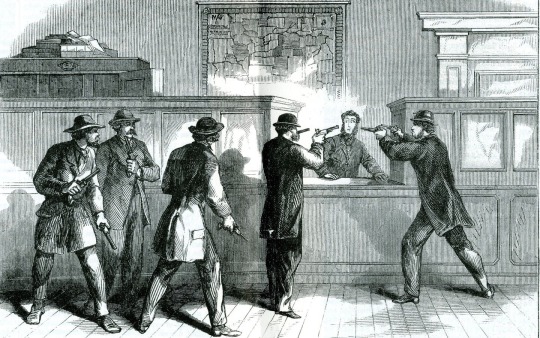
Inside the St. Albans Bank, a clerk is threatened at gunpoint by a group of Confederate raiders. FROM THE VERMONT HISTORICAL SOCIETY
YOUNG DIDN’T KNOW where the shots were coming from. There was at least one St. Albans local, possibly more, firing at his raiders from buildings on Main Street. No one had been hit, but Young hadn’t planned for armed resistance.
He had already fired his revolvers three times — at Collins Huntington; at stable owner Sylvester Field, who’d objected to the theft of his horses (the ball passed through Field’s hat); and at Leonard Bingham, a local who had tried to charge him when Young was climbing onto a horse. Young had hit Bingham, but the ball had been stopped by Bingham’s heavy silver watch, and Bingham had escaped. Young had only nine bullets left, but he was going to have to do something to regain control of a situation that was spiraling out of control.
Leonard Cross heard the commotion and stepped out of his photography studio. “What are you trying to celebrate here?” he asked Young.
“I’ll let you know,” Young said, and shot at Cross, barely missing his head. Eight bullets left.
It was time, he thought, to start setting the town on fire. His raiders began throwing their bottles of Greek fire at buildings.
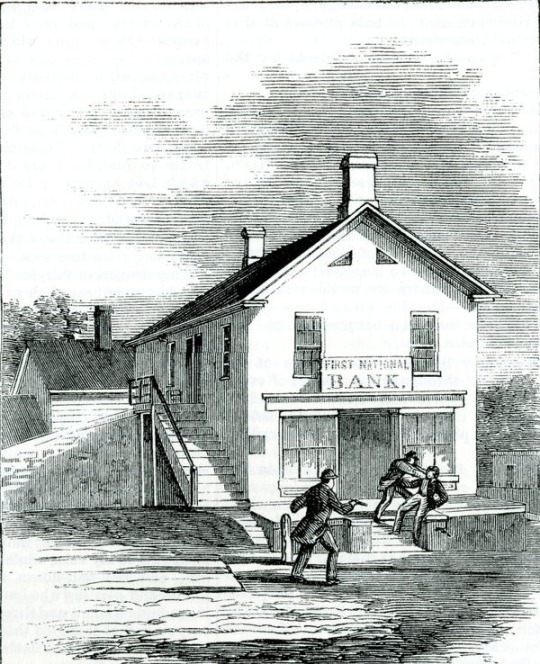
An old editorial illustration depicts William H. Blaisdell of St. Albans accost a raider outside of the First National Bank as another Confederate raced toward them. Blaisdell, like others that day, was taken at gunpoint into what today is Taylor Park. The First National sat at the southeast corner of Main and Fairfield streets, across the street from what is now Taylor Park. CREDIT: VERMONT HISTORICAL SOCIETY (these images originally appeared in Frank Leslie's magazine)
Over at the First National Bank, the third group of robbers had gathered $58,000 (nearly $1 million in current dollars). The four of them left the bank, escorting an employee toward the common, where they were going to put him with the other captives. As they were leaving, they saw a local business owner, William Blaisdell, approaching the bank. Blaisdell quickly realized what was happening and grabbed a raider, throwing him down onto the boardwalk. But other raiders pointed their pistols at Blaisdell’s head, forcing him to surrender.
Buildings should have been burning by now, Young must have realized. But they weren’t — the bottles of Greek fire had hit their targets, but they merely smoldered. Nothing was burning.
More townspeople had realized St. Albans was under attack. Nearby, at the governor’s residence, a neighbor’s servant girl rushed in to tell Vermont’s first lady, Ann Smith: “The rebels are in town, robbing the banks, burning the houses and killing the people,” the girl exclaimed. “They are on their way up the hill, intending to burn your house.”
Smith and a Scottish servant girl sprung into action, calmly closing the blinds and shades of the house and bolting the doors. Then, Smith found one of her husband’s pistols. It wasn’t loaded, but she hoped the raiders wouldn’t realize that. She carried the gun to the front steps, to stand and wait. She wished she had raised an American flag, so if they went down it would be with colors flying.
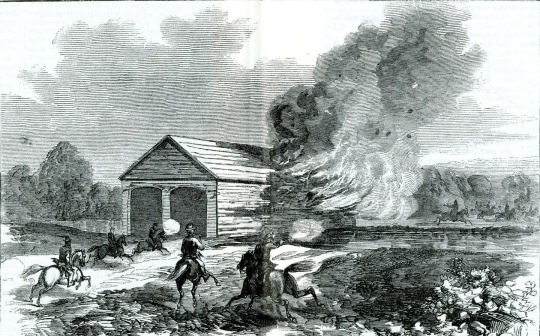
The Confederate raiders set fire to the bridge over Sheldon Creek, but it did not fully burn. FROM THE VERMONT HISTORICAL SOCIETY
BACK IN THE CENTER of town, Erasmus Fuller, a livery owner, grabbed an old six-shooter, pointed it at one of the raiders, and pulled the trigger. Click. Young burst out laughing. “Fetch me some spurs!” he yelled.
Fuller had other ideas. He ducked into Bedard’s Harness Shop and ran to the back door. He started shouting that the town was being attacked, hoping the men who were building a large hotel nearby would come and help him. E.J. Morrison, a Manchester, New Hampshire, man overseeing the hotel’s construction, heard Fuller’s shouts and ran to the stable owner.
Fuller, with Morrison now trailing behind, returned to Main Street. He saw Young, lifted his pistol again, and took aim.
“Look out Cap’n!” shouted one of the raiders. Then he and Young both fired at Fuller. Fuller ducked behind an elm tree, evading their shots.
Not so Morrison, who dropped to the ground, mortally wounded. He would be the raid’s sole fatality, leaving behind a widow and five children. (What the raiders didn’t know is that he was also likely the only man in town sympathetic to the Confederate cause.)
George Conger had heard the gunshots and come running. Young saw him, and asked, “Are you a soldier?”
“I am,” Conger replied. He had been a captain in the Union Army and had been wounded at the Second Battle of Bull Run.
“Then you are my prisoner,” Young said. But Conger dashed into the American House hotel, next to the Franklin County Bank, ran through the back and then down Lake Street toward the foundry, yelling, “There is a regular raid on St. Albans. Bring out your guns and fight!” Workers at the foundry and at the railroad grabbed weapons and followed Conger back to the center of town.
Young realized his plot was quickly unraveling. He began to move his men north, shouting, “Keep cool boys, keep cool!”
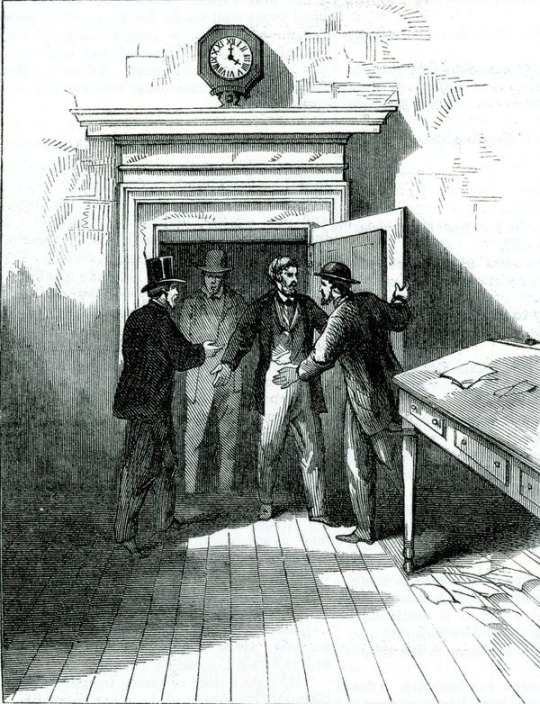
An old editorial illustration depicts cashier Marcas W. Beardsley and Jackson Clark, a woodsawyer who happened to be in the Franklin County Bank, being freed from the vault where they had been imprisoned, even though Beardsley had pleaded with the robbers explaining it was airtight. The men, who understood the Confederates planned to burn the town, feared for their lives either by suffocation or fire. J. Russell Armington and Dana R. Bailey heard their shouts and came to their rescue, however. CREDIT: VERMONT HISTORICAL SOCIETY (these images originally appeared in Frank Leslie's magazine)
Conger, gun in hand, tried to shoot at the raiders, but his gun would not fire. The Confederates started firing on him and yelling the rebel yell, but this riled up their horses, which were not used to battle. Over the din, Young was hollering, “There is too great a crowd gathering round here!” He knew they had to get out of town, and quickly.
Spurring his horse around those of his men, he told them to throw their remaining bottles of Greek fire at the closest buildings. Again, they failed to ignite. It was time to go. Once Young was sure his men were all accounted for, they were off at a gallop, occasionally turning to fire pistols behind them.
Conger shouted to all those nearby, “Bring on your horses, men, and arms and we will follow them. If you can’t get arms there is no use, they are going to fight hard!”
On the steps of the governor’s residence, Ann Smith saw a man galloping to her. The hour has come, she thought, the invaders have arrived. But the man on horseback turned out to be her brother-in-law, Stewart Stranahan, who was home on sick leave from the Army of the Potomac. Stranahan told her the raiders had robbed the banks and killed a man, but failed to set St. Albans ablaze. He had come for any weapons he could scrounge.
“Here, take this pistol, it is all I have yet found,” Smith said, feeling rage build inside her. “And, Stewart,” she added, “if you come up with them, kill them! Kill them!”
Soon, Conger and a posse of some 50 men were in pursuit of the raiders, followed quickly by 40 more men led by Stranahan. The Confederate party split up before it reached Canada, to increase the odds of escape. Conger’s militia reached the border and kept going, joining with some Canadian constables. They were able to capture about 13 raiders, including Young, and some of the $208,000 ($3.5 million in today’s money) that was later determined missing.
THE PLAN OF THE St. Albans group was to bring their prisoners back to town to face charges of murder. But as they neared the border, more Canadian authorities arrived at the scene and demanded charge of the rebels. Conger reluctantly agreed. The prisoners were first brought to St. Johns and then transferred to Montreal on October 27. The raiders were well received by a contingent of Canadian Confederate sympathizers, cheered as they were brought to jail.
They gave Young and his men food, clothing, and even liquor. Some of Montreal’s finer restaurants sent over meals and scores of citizens visited them at the jail, where they had been given a large room rather than cells. A relaxed Young wrote to the St. Albans Messenger requesting two copies of the paper be delivered each day. “Your editorials are quite interesting and will furnish considerable amusement to myself and comrades,” he wrote.
Young’s taunting infuriated many Vermonters, and for a short period of time it appeared that the Confederates might succeed in dragging Canada into the war against the Union. The St. Albans Messenger editorial page stated that if the prisoners were not handed over, “The sooner we declare war on our neighbors to the north, the better.” Lincoln’s secretary of war, Edwin Stanton, later called the St. Albans Raid “one of the most important events of the war,” with the potential to draw both Canada and Britain into hostilities.
But over the next few months, a series of contentious court proceedings went against extradition, as Canadian judges ruled that the raid was an act of war, not murder and robbery. All the raiders were eventually freed.
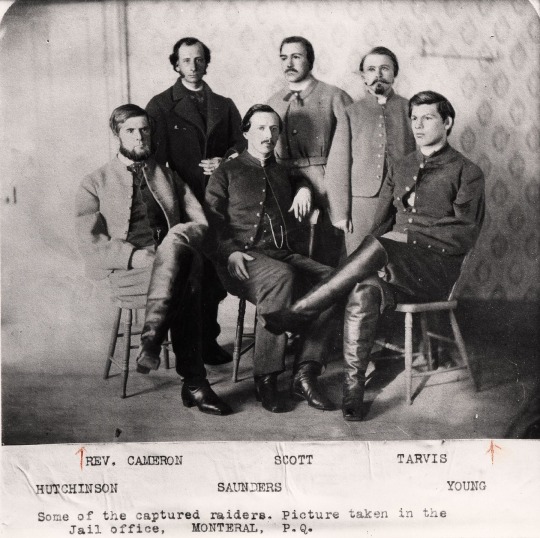
Some of the Confederates in jail in Montreal. Bennett Young is seated at right, William Hutchinson is at left. FROM THE VERMONT HISTORICAL SOCIETY
But Bennett Young’s gambit had failed. Perhaps if the Greek fire had worked and more damage had been done, it would have enraged Vermonters more. Or if there had been follow-up raids on Swanton or other towns. But the St. Albans citizens had forced them to abandon those plans. No Union troops were diverted to the border, Canada and Great Britain did not enter the war, Lincoln was reelected, Sherman reached the sea in late December 1864, and on April 9, 1865, Lee surrendered at Appomattox Court House. The Canadian government even reimbursed the Vermont banks for the amount of money it found on the raiders, approximately $88,000. The other $120,000 was not accounted for.
After the war, Young was specifically excluded from an amnesty for Confederates. He fled to the United Kingdom, where he studied law. He returned to the United States after a full amnesty was granted in1868, becoming a successful lawyer in Louisville, Kentucky, and was regularly applauded at Confederate reunions and parades.
In 1911, when he was 68, Young took his wife on vacation to Montreal. He contacted the people of St. Albans, saying he would like to meet with them. The town sent a four-man delegation to the Ritz-Carlton, where he was staying. Young put on a Confederate uniform for the session, and told his visitors that “the raid was only the reckless escapade of a flaming youth of 21 years, steeped in patriotism for the South.” Perhaps it was something like an apology. The get-together was friendly and lasted well into the night.
— Michael Tougias is the author of more than 30 books for adults, most recently “The Waters Between Us,” and five for middle readers. He is currently working on a book about the St. Albans Raid. Send comments to [email protected]. In addition to reporting and eyewitness accounts from the St. Albans Messenger and other periodicals, significant sources for this story include materials from the St. Albans Historical Society and The St. Albans Raid, Complete and Authentic Report by L.N. Benjamin.
0 notes
Text
A Relatively Deep Dive Into My “Crème de la Crème” MCs - #1. Mavis Linnet
(From the astonishingly crisp interactive fiction by @hpowellsmith! ...It’s not weird to tag, right?)
Mavis “Miss Linnet” Mallee-Linnet
she/her/hers
Light brown complexion and loosely curled brown hair
Favors conventionally masculine fashion
Accommodating
Manipulative
Traditional
Exceptional Poise
Noteworthy Wit and Intrigue
Commonplace Spirit
Unremarkable Flair
LOADS more info and spoiler content under the cut!
I envision Mavis as having grown up in a wealthy household, where she was still raised reasonably well about the importance of non-profligate spending. Her parents both taught at Olmstead’s Valley School, where she was in attendance for the bulk of her college-age years. Sailing was manageablely smooth. Mavis got along well in her studies, had time for both dressage and lacrosse, and—for her genuine interest in the subject matter—made it on the good side of many educators there (albeit not as often her fellow students, being for all the world their definition of a teacher’s pet!).
Her life took an abrupt shift in its trajectory when Mr. Mallee, her father, had a shameful affair come to light. Their rural community was small enough that such a thing made waves. Her other father, Mr. Linnet, sent Mavis off to Gallatin with the still-favorable Linnet name, and spent a pretty penny to do so. Primarily, he did this to save her from suffering by association, and was very vocal about these intentions. He’s definitely also relying on her to save their social standing, and despite the point being markedly unspoken, Mavis quietly understands.
So, Mavis feels an immense pressure to make the most of her time at Gallatin. She tries to conform unfalteringly to the school’s every long-winded social expectation, which exhausts her utterly. However, by her proficiency in book research, and her sincere knack for studying people, she has grown excellent at “playing the game” in high society.
More than ever, Mavis is dedicated to her studies at Gallatin, even when the prescribed syllabus is less than stimulating. She keeps her head down so to never risk rocking the boat. This mode of being doesn’t make her happy per say, but the Gallatin atmosphere has her shoehorned into believing there’s no feasible alternative. She’s cognizant of surface level flaws in the system, but plays along because she thinks she has to. After all, it’s her way out of rural smallmindedness and into an academic world. That said, things certainly can change, particularly when one can’t help but notice atrocities being committed against literal children!
5’10”, with broad shoulders but slender hips. Her body makes an upside-down triangle shape.
Prone to acne, her skincare routines are extensive, and she’s usually up at the crack of dawn every day to get her proverbial ducks in a row.
Her hair is thinner than it looks, and she takes especial care when rationing it about her scalp. She feels vulnerable with it all the way down, so favors hair styles with low centers, such as looped pigtails, a nape bun, or double braids. Also labors to hide her considerable widow’s peak.
A heavy tea drinker. For all of her wits, she doesn’t realize that her mug o’ choice (earl grey) is highly caffeinated. She slugs the stuff down each day without ever realizing, because it “makes her feel better” about mornings.
Though it’s hardly polite, she LOVES gossip, and writes down every secret she hears as her guiltiest pleasure.
Miss Dalca and Mr. Griffith both make her uncomfortable—the former for her extreme progressiveness, and the latter for his gruff demeanor. Mr. Blanchard is her favorite teacher, and I bet she’s accidentally cried in his presence before. She’s scared of Lady Renaldt, and makes herself known to the headmaster only out of necessity.
Virtue: 91%
Popularity: 75%
Coursework Grade: A
Exam Mark: A+
Extracurricular(s): Birchmeier Society and the Gallatin Swans (goalkeeper)
*[Though not doable ingame, I like to think that she overloaded her schedule and dropped the Swans halfway through the semester. Mavis is never the type to drop anything, so having to take that step back was a double-edged blow to her confidence, in addition to being a sheer relief on her stress levels. Since the Birchmeier Society was where her heart truly lay, she managed to build herself back up there with Freddie’s support.]
Entanglements: Romantically engaged to Freddie.
Besties and then some with Freddie. They’re both hardworking scholars with each their own zest for learning, and by preparing for classes, exams, and Birchmeier Society biz in the same shared spaces, Mavis spent disproportionately more time with her than with anyone else. Freddie encouraged Mavis to be a bit less hard on herself, and was brave enough to stand up to her whenever Mavis’s fatigue was turning her curmudgeonly. Mavis helped get Freddie out of her own head on multiple occasions, taught her to break the most overwhelming situations down to deal with day-by-day, and bolstered her confidence anytime it faltered in the face of the Gallatin sphere. The engagement was Mavis’s idea, which she accidentally blurted out in a rare impulsive burst of feeling. After processing the implications, she was ashamed to have second thoughts upon remembering Freddie’s financial situation. It seemed for a while that the engagement was off, following a hard conversation that soured their relationship for awhile. I don’t think Freddie would easily bounce back after having her family standing scrutinized. However, the mine plot—when Mavis had to ultimately turn her back on everything she’d built at Gallatin—spurred character development enough that Freddie deemed her worthy of a second chance.
Friends with Gonzalez, who couldn’t help but respect that Mavis was competent in lacrosse, academically accomplished, and generally pretty nice to people. I don’t think she realizes that Mavis keeps a stiff mask. Mavis found Gonzalez refreshing, albeit off-puttingly honest, and couldn’t find a way to fault her spirited nature. I can’t imagine them engaging much off of the field (i.e. post Mavis quitting the team), but the two were mutually supportive in their interactions, even if Mavis was probably repressing some criticisms of Gonzalez’s fast and loose attitude all the while.
Friends with Max after he tutored her in flair, per Lady Renaldt’s instruction, via a sick dance sesh. I like to imagine him groaning about the task, assuming that Mavis would be a hopeless case, and then being pleasantly surprised at the fact that she can absolutely hit it (even just in the name of compliance with authority). He tried to make a move on her and was politely rejected. I think he supports the idea of her at a distance after recognizing that she’s not trying to breathe down anyone’s neck, and really is a kind, tired gal being squeezed dry by the system.
Friends with Hartmann, who was initially confused about which “side” Mavis was on in her prefectural feud with Max (Mavis shushed him at the opening commencement, which she liked, yet supported Max when he dipped out the common room window). They came to understand each other in the later game, bonding over how ill-affected they both are by the pressures of their respective positions. They don’t “hang out” much, but a couple of key deep conversations put each in the other’s good books.
Pleasant acquaintances with Karson. Mavis rarely went out of her way to talk to them, but whenever they crossed paths, she was good to Karson, and sympathized (albeit at a respectable distance) with their situation as a servant. When trouble in the mines was first coming to light, Mavis got sniffing, and sussed out enough clues that Karson eventually passed Blaise’s note on to her directly, trusting her moral compass enough to do so.
Unpleasant acquaintances with Delacroix. His unconventional take on life, passion for the intangible, and apathy towards collegiate procedure all make her uneasy. In his own right, Delacroix probably takes her for a stuffy, self-centered dud, which after all the times she’s reflexively shut his occult talk down, is pretty fair.
Acquaintances with Blaise. Mavis made nice in the early game because she had to, and was secretly relieved when she “resigned.” This was short lived, and turned into a misplaced sense of guilt after what actually happened to Blaise came to light. Mavis didn’t end up in the mines herself, but she did everything she could to help her, Miss Dalca, and eventually Gonzalez escape. When all was said and done, Blaise still made Mavis uncomfortable, and she let her be to get on with her life.
Approached Rosario at the punch table in an attempt to court the princess in the room… absolutely blew it. Ended up tripping over her own tongue when she realized that the heir is not so predictably wooed by traditional measures as originally anticipated. I like to think of that moment as a point of deeper connection for Mavis and Freddie, where both were totally overwhelmed by the noble sphere at Archambault and turned to each other for comfort. Otherwise, Rosario was a Rosari-no for Mavis.
Was weirded out by Auguste. Mavis fears any authority figures who don’t like her right away, and they’re too close to the ever-frigid Lady Renaldt for her comfort. She did totally trash them (benevolently) at dressage on sports day, though.
Gave Florin the widest possible berth. Mavis wanted nothing to do with that kind of scandal, but definitely found her shallowly cute.
Some Choice Plot Pieces (cue spoilers):
Gathered evidence against Miss Dalca in compliance with Lady Renaldt.
Had an adequate working relationship with Miss Benton.
Gathered information for Annick against Lady Renaldt.
Endgame (cue SUPER spoilers):
Worked in secret against Lady Renaldt.
Sent Gonzalez to the mines, but most everyone got out (I believe Miss Dalca died?!).
Settled things quietly with Kathrili Burgin.
Went on to study at Gessner.
Joined Freddie for the summer.
12 notes
·
View notes
Text
Sires and Sons
Chapter 4 of ?
First chapter, previous chapter
A/N: I definitely missed the right day for this one, but the last week hardly even happened and time is an illusion so whatever! Anyway this chapter’s full of Lore and a Twist so have fun losers /j
Synopsis: When the twins split two years ago, Janus was tasked with raising Remus. His only help was the evasive and sullen Virgil- who he already had to wrangle like a stray teenager. The endless days in the Dark Side’s Mindpalace were broken only by monthly catch-ups with Patton, and the only thing that ever changed the stories that Janus used to get Remus to bed. This time, though, something was different: secrets were slipping through Janus’ lips- and past the divide between Dark and Light.
Ships: Moceit (probably just bg but I don’t actually know can you tell I’m a professional-)
Word count: 1122
That afternoon, after Logan and Patton had left- without Virgil- Janus faced a thousand questions at the tiny hands of Remus.
“Who were they? Where’d they come from? What were they doing here? Are they the ones you go on work meetings with? I thought there was only one? I know you like him!”
Virgil was no help- he’d shut himself in his room the moment he’d been let off of Remus duty. Janus knew he should check on the dreary side, but the leftover frustration from the earlier argument still fizzled in his chest, snapping at anyone who dared to set him off- and it had found an easy victim in Virgil.
Janus sat his kid on the stiff couch.
“Remus. Let me answer.”
“Why were you angry at them? Why’s Virgil angry at you? Who should I be angry at- am I supposed to be mad at you, Jan? I can do that, watch-” The side twisted their face into a scowl. Janus sighed.
“Remus.”
“I don’t like that tone, Mister!”
“Remus.”
The kid’s face fell like a kicked puppy’s, but Janus didn’t relent. “Listen to me,” He stressed. “You’re being immature.”
Remus scowled for real this time.
“Well, what if I don’t wanna hear what you were gonna say anyways!? Cause I don’t if you’re gonna be mean.”
Janus gritted his teeth, forcing the irritation nipping at him to still. He apologized to Remus, trying to think of a way to make Remus actually focus. He sighed as he fell on the only answer.
“Before the Light Side was a stable, loving kingdom, when King Thomas was just a Prince- there was turmoil.” Remus, as much as he tried not to show it, was interested. “The Prince had six royal helpers. The baker, the archivist, the advisor, the prophet, and the inventor.
“Of course, back then, life was a game. They were children, you see, and had given themselves fancy names and titles- but at that age, in that environment… it’s easy to get lost in the story.
“The first two children you know- the archivist was one day to become the advisor, and the baker stayed true throughout the years.
“The prophet was quiet as a mouse, creeping about as though he had already lost his seat at the table. When the others asked for his input, he was always surprised. He pointed out every possible outcome, turned over stones to see what malicious grubs crawled underneath. He brought the game to truth, added pressure until the scale tipped into fear- Prince Thomas grew to live in the future, trying to solve the kingdom’s problems as though the responsibility already belonged solely to him.
“The advisor of their time had a mastery of strategization, especially navigating the give and take between rulers to keep balance between kingdoms. He knew-”
“Why is everyone in your stories a he?”
“...”
“Jus’ seems kinda bias to me, that’s all.”
“...He knew what time and supplies they could bear to part with for the benefit of others, but he also kept in mind the limits of the kingdom, the needs that must be met to keep their own people strong. The Prince, however, always kind, often vetoed the advisor’s calculations in favor of giving more than they should. The pâtissier believed, in his unwavering efforts of peacemaking inside the castle and out, that their supplies and strengths were best given away.
“Thomas had a strong platonic relationship with the bubbly pâtissier already, and thus trusted his judgment more than his advisor’s. Because his own nature agreed with the pâtissier’s as well, he found less and less of himself urging to consult his advisor in times of division.
“His archivist, too, he found trust in- each time he chanced a meeting with the boy in the royal library, he would answer any question the Prince could think to ask with nothing but unbiased fact. Thomas would eventually find his way into the man’s affections- as happened often with the kind Prince- and once he was close enough to see his vulnerabilities and opinions he found they quite matched up to his own. From then on the archivist was his true, unofficial advisor, and the previous was pushed to the side by the Prince’s altruistic morals.
“His closest friend, though, was the inventor. Excitable and imaginative, he helped the Prince think outside the box, push past the politics of a situation to find the beating, bloody heart of the humanity he was trying to protect. He was brave and daring, and had no qualms like that of the pâtissier’s about going too far. As the Prince’s dilemmas grew more complex, however, the inventor’s habit of flitting from opinion to opinion made him unpredictable and sometimes rash.
“The Prince stayed up each night debating and worrying, pushed by the prophet into urgency and almost never reaching a singular conclusion- every debate turned to an argument at the hands of their many differences. The archivist and the pâtissier watched as the endless battle to form opinions, ideas, and solutions spiraled, the lack of sleep effecting every facet of his life- his childhood, really- and soon found that something had to be done about it.
“They decided to narrow down the amount of helpers in the Prince’s court, lest the goal of assistance be lost in numbers. What they failed to take into notice was that the true plague was but a bacterial dissonance, not an infectious wrongdoing.” Remus’ face was scrunched up in effort, and Janus dialled back on the long words. “The personalities and flaws in the Prince’s court weren’t the underlying issue. It was the unwillingness of some to see the perspective of others that drew them apart,” he remedied.
“The pâtissier and the archivist, however, couldn’t see that. They held counsel with Prince Thomas and ruled that some of his attachments were doing more harm than good- that some of them were infectious, that they’d only spread their illness to those around them. They ruled that some of his friends had to be sent away.
And that is the story of how the archivist became the advisor, and of how the prophet’s chair at the table was finally pulled away.
The inventor, however, stumped the pâtissier. While he was brave and powerful, he wasn’t as guarded as the others thought he should be. He had been unchanged by the pressure to conform, and the advisor was afraid that his lack of a polite filter could influence Prince Thomas, something that they saw as potentially catastrophic to his political stance.
Finally, they raised the problem with the inventor himself- and he had an out-of-the-box, unfiltered idea. Ironic, really, that they took him up on it.”
TAG LIST
@dolphin-squirrel, @thenaiads
#sires and sons#fanfiction#fanfic#sanders sides#sanders sides fanfiction#sanders sides fanfic#sanders sides fic#thomas sanders#tss#tss fanfic#tss fic#janus sanders#remus sanders#patton sanders ment#roman sanders ment#logan sanders ment#romulous sanders ment#king sanders ment#king sanders#child!remus#child!roman#parental!janus#virgil sanders#mc!janus
13 notes
·
View notes
Text

@cadcnce said: 💝How long until they feel secure and comfortable in a relationship?
My Muse in a Relationship (Still Accepting)

Sonia feels secure in a relationship, generally, when the following three statements are realized:
1. Her loved one is happy. Not just insisting they are but really showing as such, without necessary force. There’s no declaring “I’m fine” and yet inside, they’re miserable.
2. Her loved one wants to be with her, and everything that comes with her. This is the point that a younger Sonia may not notice or care about so much but an older one will definitely pay attention to. It’s not as easy as just being in love with someone else, there’s a large amount of baggage, both positive and negative, that comes with being in a relationship with her. It’s an opulent life that Sonia leads, and if her loved one enjoys that sort of thing that’s definitely a bonus. But it also comes with a lot of rules, expectations, criticism, and if it’s a very serious relationship, ultimately having to conform to a lot of social and familial standards set by her country and her family. An older Sonia worries quite a bit that this is too much for almost anyone to take on, and yet those who have spent their lives preparing for such a responsibility are people she often can’t fall in love with due to differences in values and interests. When that loved one makes clear that they love her, all of her, and are willing to take on those new responsibilities and pressures because they believe in her and the future she’ll eventually help create, that puts her fears (mostly) at ease.
3. Her loved one, ultimately, loves Sonia first and foremost for the person she is and not the title and wealth she’s been born into or will inherit someday. She’s not on a pedestal with them. While she does need a partner who will embrace every bit of her, she also needs someone who fell in love, and remains in love, with Sonia for Sonia, and not the Princess of Novoselic. This is where Kazuichi Souda tends to get it wrong in trying to court her, because he’s more obsessed with having a hot blonde princess as a girlfriend than any of Sonia’s other, more significant qualities, many of which would clash with his own personality overall.
The other aspects would be commitment and just the general understanding that a partner is just as in love with her as she is with them. She doesn’t do casual hookups (at least on her end, even if she hasn’t quite made it clear to the other person that to her, this is anything but casual) and infidelity is the number one thing that will cause her to distrust and split from a partner. It reminds her too much of her own family and Sonia refuses to live as unhappily as many of them do.
#more-than-a-princess answered#more-than-a-princess musings#cadcnce#(My Muse in a Relationship meme)#(Thanks for the ask!)
1 note
·
View note
Photo



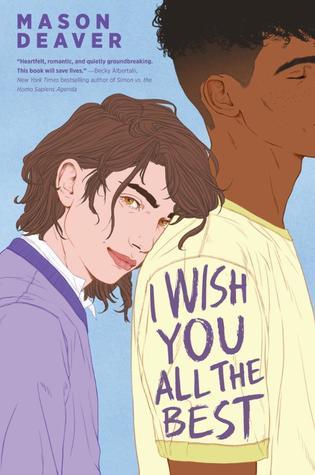
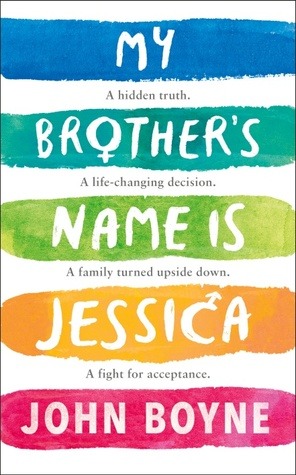

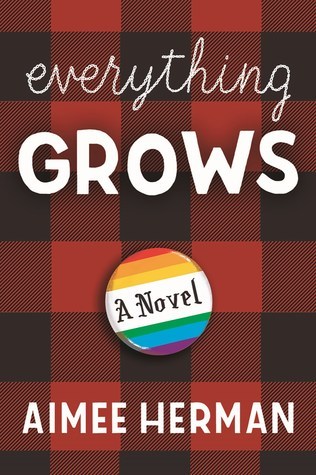
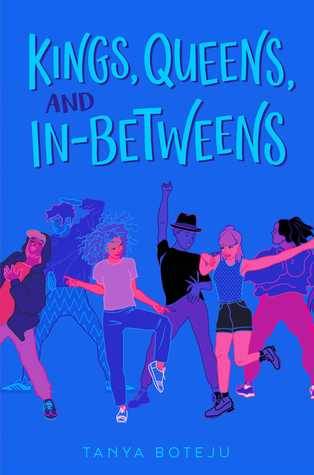

2019 Upcoming YA Fiction With Transgender, Nonbinary and Gender Non-Conforming Characters!
My last list focused on LGBTQA Fiction with female-led characters. There aren’t many of those this year that also happen to have transgender characters, so I’ve decided to put all the novels covering this topic in one list. It’s unfortunate there aren’t as many stories about transgender characters, let alone #ownvoices stories, but we can all hope that in the next year we’ll see even more! There are a few coming out stories, and a couple of romances in this batch of 2019′s LGBT fiction.
Below you’ll find titles, summaries, and goodreads links. Warning for mentions of transphobia and transphobic violence.
The Hand, The Eye & The Heart by Zoe Marriott
Zhilan was assigned female at birth; despite an unusual gift for illusions, they know they will live out their life in the perfumed confines of the women’s quarters. But when civil war sets the country aflame, Zhilan is the only one who can save their disabled Father from death on the battlefield.
By taking his place.
Surviving brutal army training as a male recruit – Zhi – is only the first challenge. Soon Zhi’s unique talents draw them into an even more perilous fight, in the glittering court of the Land of Dragons, where love and betrayal are two sides of the same smile. The fate of an Empire rests on Zhi’s shoulders. But to win, they must first decide where their loyalty, and their heart, truly belongs.
Zenobia July by Lisa Bunker
Zenobia July is starting a new life. She used to live in Arizona with her father; now she's in Maine with her aunts. She used to spend most of her time behind a computer screen, improving her impressive coding and hacking skills; now she's coming out of her shell and discovering a community of friends at Monarch Middle School. People used to tell her she was a boy; now she's able to live openly as the girl she always knew she was.
When someone anonymously posts hateful memes on her school's website, Zenobia knows she's the one with the abilities to solve the mystery, all while wrestling with the challenges of a new school, a new family, and coming to grips with presenting her true gender for the first time. Timely and touching, Zenobia July is, at its heart, a story about finding home.
In The Silences by Rachel Gold
When did life get so dangerous? Kaz Adams just wants to read comic books with her best friend, Aisha Warren. And maybe get up the nerve to ask her out, if Kaz turns out to be a gender that Aisha’s into.
Kaz figured she’d be the target of violence for her gender nonconformity, but a fatal police shooting thirty miles from their town opens her eyes to the realities of racism. She watches as pressures at school and in their social group mount against Aisha. Kaz would try to stop a bullet for Aisha if she had to, but she has no idea how to stop the waves of soul-crushing disapproval and judgment. When she talks to the other white students and adults in her area, they don’t seem to understand what she’s talking about.
Aisha has helped Kaz find a place in the world, but that was about Kaz’s gender expression. Kaz can’t magically change the world for Aisha, but something has to change in their school system or she’ll lose the girl she loves.
I Wish You All The Best by Mason Deaver
When Ben De Backer comes out to their parents as nonbinary, they're thrown out of their house and forced to move in with their estranged older sister, Hannah, and her husband, Thomas, whom Ben has never even met. Struggling with an anxiety disorder compounded by their parents' rejection, they come out only to Hannah, Thomas, and their therapist and try to keep a low profile in a new school.
But Ben's attempts to survive the last half of senior year unnoticed are thwarted when Nathan Allan, a funny and charismatic student, decides to take Ben under his wing. As Ben and Nathan's friendship grows, their feelings for each other begin to change, and what started as a disastrous turn of events looks like it might just be a chance to start a happier new life.
My Brother’s Name is Jessica by John Boyne
Sam Waver's life has always been pretty quiet. A bit of a loner, he struggles to make friends, and his busy parents often make him feel invisible. Luckily for Sam, his older brother, Jason, has always been there for him. Sam idolises Jason, who seems to have life sorted - he's kind, popular, amazing at football, and girls are falling over themselves to date him.
But then one evening Jason calls his family together to tell them that he's been struggling with a secret for a long time. A secret which quickly threatens to tear them all apart. His parents don't want to know and Sam simply doesn't understand.
Because what do you do when your brother says he's not your brother at all? That he thinks he's actually... your sister?
Something Like Gravity by Amber Smith
Chris and Maia aren’t off to a great start.
A near-fatal car accident first brings them together, and their next encounters don’t fare much better. Chris’s good intentions backfire. Maia’s temper gets the best of her.
But they’re neighbors, at least for the summer, and despite their best efforts, they just can’t seem to stay away from each other.
The path forward isn’t easy. Chris has come out as transgender, but he’s still processing a frightening assault he survived the year before. Maia is grieving the loss of her older sister and trying to find her place in the world without her. Falling in love was the last thing on either of their minds.
But would it be so bad if it happened anyway?
Everything Grows by Aimee Herman
Fifteen-year-old Eleanor Fromme just chopped off all of her hair. How else should she cope after hearing that her bully, James, has committed suicide? When Eleanor’s English teacher suggests students write a letter to a person who would never read it to get their feelings out, Eleanor chooses James.
With each letter she writes, Eleanor discovers more about herself, even while trying to make sense of his death. And, with the help of a unique cast of characters, Eleanor not only learns what it means to be inside a body that does not quite match what she feels on the inside, but also comes to terms with her own mother’s mental illness.
Set against a 1993-era backdrop of grunge rock and riot grrl bands, EVERYTHING GROWS depicts Eleanor’s extraordinary journey to solve the mystery within her and feel complete. Along the way, she loses and gains friends, rebuilds relationships with her family, and develops a system of support to help figure out the language of her queer identity.
Kings, Queens, And In-Betweens by Tanya Boteju
Perpetually awkward Nima Kumara-Clark is bored with her insular community of Bridgeton, in love with her straight girlfriend, and trying to move past her mother’s unexpected departure. After a bewildering encounter at a local festival, Nima finds herself suddenly immersed in the drag scene on the other side of town.
Macho drag kings, magical queens, new love interests, and surprising allies propel Nima both painfully and hilariously closer to a self she never knew she could be—one that can confidently express and accept love. But she’ll have to learn to accept lost love to get there.
What Makes You Beautiful by Bridget Liang
Logan Osborne knows he likes boys, but has not come out to his family or at school, and no one knows that he likes to sometimes wear girls' clothes and makeup. When he starts at a school for the arts he finds a wider range of gender and orientation being accepted. Logan is attracted to Kyle, who has gay dads. But Kyle is straight. Logan finds he doesn't like the way gay boys treat him, and a disturbing hookup with a boy who is fetishistic about Logan's half-Asian background makes Logan even more confused about what he wants and who he is.
Encouraged and supported by his friends at school, Logan experiments with nail polish and more feminine clothes in public. Logan begins questioning his gender and decides to use they pronouns while trying to figure things out. Logan meets a classmate's chosen mother, who is a transgender Chinese woman, and begins to come to terms with their gender identity. Realizing they are not a gay boy, but a transgender girl, Logan asks for people to call them Veronica. As a girl, does Veronica stand a chance with Kyle?
2K notes
·
View notes
Text
Chapter 6: The Drawer
Ae-Young’s POV
Since I was in high school, Dad had been paying me to do the errands he hated. I guess I imagined that once I graduated from college, I would walk right into a career, and I wouldn’t rely on him for money anymore. As it was, though, my part-time job with the local news didn’t pay enough for me to afford the camera lens I was craving. So, for the sake of my art, I swallowed my pride and conformed to my old schedule of bringing his lunch to work every day.
One day when I walked into his office, he raised his eyebrows. His eyes smiled at me over his silver-rimmed oval glasses. “I see you have two bags. Does this mean you’ll eat lunch with me today?”
He gestured to one of the seats across from him with such enthusiasm, I almost accepted his invitation. No, I decided, he’ll be more thrilled with my plans for this other bag of takeout. I shook my head as I placed one of the bags on his desk. “No, sir— I actually planned to surprise Kyuhyun. Where’s his office?”
Dad blinked at the question before smiling proudly. He stood to deliver the instructions: “It’s just down the hall. Turn right when you walk out and it’s three doors down.” Glancing at his watch, he urged, “You better hurry, though. He usually leaves for lunch at this hour, and he’s a creature of habit.”
When I followed Dad’s instructions and stepped into Kyuhyun’s office, a much smaller beige room that was occupied almost entirely by two white bookcases that stretched from tanned hardwood floor to cream-colored ceiling, he was shrugging into his brown coat. I found my voice when he reached for his umbrella just to say, “It isn’t raining today.”
If he was surprised to see me, he hid it excellently. He pulled the umbrella out of its basket in one swift motion, undeterred by my words, and reasoned, “It’s not raining now, but it could start at any time.”
I pressed my back against the door frame and replied, “The forecast doesn’t predict any rain.”
He nodded, “I know,” but clutched the umbrella firmly.
There was no reason to convince him to drop it since he seemed so determined to carry it. You or I or anyone else would look silly carrying an umbrella on a golden sunny day, but Kyuhyun wouldn’t. While others would gawk at me if I did such a thing, most likely wouldn’t notice him; and if they did notice him, it would only be to say ‘That man looks like I picture I once saw, or maybe I only saw him in a dream.’ And he wouldn’t hear them or notice their gaze.
“You’ve gone silent,” he realized, “and you’re holding a bag.”
My cheeks burned as I winced at being caught thinking about him so intently. It didn’t matter that he didn’t know what took my voice away— it didn’t matter that I didn’t have to tell him why I couldn’t form a sentence— I knew why, and I couldn’t force it from my mind.
I tried to swallow my shame. “I brought you lunch!” I smiled while holding the bag out to him. He dropped the umbrella to receive it and take it to his desk. “I guess I could have told you before you got dressed to go out. Sorry.”
Kyuhyun shook his head while shedding his coat. He said, “I don’t mind,” but I knew how precious time was to a lawyer.
Still shrinking, I bowed quickly and dashed out, but he called after me. “Aren’t you going to stay with me?”
His voice was impossible to ignore. And even if it was just a whisper, I thought, I would have heard it and turned around. I stalled in the doorway and promised, “I’ll stay if you want me to, but I didn’t bring enough food for two.”
Kyuhyun didn’t reply. He walked around his desk to pull the guest chair out; the invitation to stay was unmistakable before he looked at me from his seat. Despite how flustered I felt— despite the small voice urging me to hide until his eyes didn’t make me feel like this— I didn’t want to leave. And I didn’t care whether he shared the food or kept it all to himself. I don’t know what I was staying for— except I did— but don’t make me say it— it’s too early.
He smiled when I lowered into the seat. “Do you cook?”
The question might have been rude had it been asked by anyone else. Kyuhyun’s tendency to ask or say anything that crossed his mind was never offensive— not to me anyway. When he asked, he had been busy assessing the meal and dividing it into halves to split across the styrofoam container. Awaiting my answer, he tilted his head.
When he looked at me like that— even when asking something as simple as ‘How is the weather’ — I would try to offer whatever answer would please him. I would never lie to impress anyone, and Kyuhyun was no exception, no matter how pretty his eyes were.
It seemed rude to take a mouthful of food without having responded, and for some reason, I couldn’t quite meet his gaze. The answer was no, so I shook my head. “I don’t even know if I can cook.”
It wasn’t the answer he wanted, but he wouldn’t admit it. He only nodded before starting to eat, but I felt pressured to explain, “Nobody ever taught me how. After Mom left, Dad hired a chef— and he’s quite a character. His eyes hurl fire if I, Heechul, or even Dad step into the kitchen. He calls it his ‘sanctuary.’”
Kyuhyun briefly looked away when I mentioned my mother, perhaps thinking that she left a gaping wound, but he just as quickly composed a kind smile. “I see. I’ve tried to cook before, and it has never gone well.”
It was hard to believe that he would struggle with anything. I hummed, “Really?” suspiciously.
And he laughed. “Why are you so surprised? I can’t even make instant Ramen.”
“Even I can make things like that!” I blurted, clamping a hand over my mouth when he dramatically gasped. “I just— you look like you can do anything, so I’m a bit surprised.”
“Ah,” he nodded and adorned a teasing smile. “So you thought I was perfect— that’s why you got all quiet earlier. Well, Ae-Young, I hope I don’t seem less like an ideal husband just because I can’t cook.”
Nervous at how his jokes so closely reflected the truth, I suggested, “We could always hire somebody like Dad did. Or— you know, I have a list of all the best takeout places from my college years—”
“Your college years!” He threw his head back laughing. “You talk like they’re some distant memory.”
Kyuhyun’s attempts at humor were never actually that funny, but there was something about how his smile softened and illuminated his otherwise solemn face. I had to smile as I jested, “I’ll remember this next time I get a chance to joke about how ancient you are.”
Silence fell over the room so suddenly that I might have assumed that he was offended if I didn’t know that he didn’t mind things like that. When I looked up at him, his head was tilted again, but he hadn’t asked anything.
Assuming I missed the question, I asked, “What is it? Why are you looking at me like that?”
His face seemed to have darkened to a slight pink as he said, “I was just thinking. . . today is the first time you’ve talked about what our life together will be like.”
“Oh.” He was right. When we talked on the phone or at Family Dinners or face-to-face as we were doing then, I was careful to avoid the subject because of how often I misspoke. Since he brought it up, before the chance could pass, I told him, “Marrying you won’t be so bad.”
He bit back laughter. “Oh, so I’m still tolerable? That’s good to hear.”
As glad I was to hear his laugh, my heart faltered at that reaction to my attempt at sincerity. “No— I mean I think I would like—”
I didn’t get to tell him that, if I were a little older and worthier, I would have wanted to marry him. His assistant appeared in the doorway to say that their court appearance had been rescheduled and that they had to leave immediately to make it on time.
“Okay, I’ll be right there.” Once the assistant left, Kyuhyun frowned apologetically, likely assuming that my mouth curved into a frown because he was leaving early. “I’m sorry that I have to go. Thank you for bringing lunch and for staying with me.”
I nodded and pulled my frown into a wobbling smile. “You’re welcome.”
He gestured to the food. “You should take this with you.”
And after pulling his coat over his sky blue sweater, after grabbing his umbrella, he stopped to ruffle my hair and fondly say, “Let’s do this again tomorrow.”
I softened at his touch and agreed, “Okay,” and— sure that he wouldn’t notice— I watched him leave. But once he was out of sight, the warmth that had been growing in my chest cooled with the reborn realization he still thinks I’m a kid.
I never practiced self-reflection until I was engaged to Kyuhyun, so I wondered does everyone think I’m a child? But it didn’t matter what everyone else thought. When he looked at me, he probably remembered what I looked like when I was learning to walk. When he looked at me, although this moment couldn’t mean as much to him as it did to me, he probably remembered how I simultaneously melted and soared when he asked me to dance at one of my birthday parties.
Even then I knew it was only out of kindness that a handsome teenager with a beautiful girlfriend would entertain a childish crush, but the memory was still precious to me. He definitely remembered how he would often meet me at the bust stop— and sometimes at my school— because Mom was gone, and Dad was too busy with work, and Heechul couldn’t be relied on to bring me home after class.
People say that age differences don’t matter so much in the adult world. So why did things feel just the same as they had been when I was a kid? If I was honest enough to admit that I had probably always been in love with Kyuhyun, even when I thought I wasn’t, that meant nothing had ever changed. Yes, we were planning to get married, and we spent more time together than apart, but I knew that was only because of Dad’s planning for my future. It was out of respect for my father that Kyuhyun learned to enjoy my presence— not out of any particular interest in me— and that fact struck me every time we parted ways.
It wasn’t so much a process of falling in love with him as it was a process of realizing that he wasn’t some ideal. Maybe a part of growing up was realizing that I liked the real Kyuhyun as an arranged fiancé than I ever liked him as a flawless childhood crush, but I didn’t see it like that at the time. All I knew was that it didn’t hurt so much to be overlooked as a kid.
I didn’t cry when I met his girlfriend because she seemed so much like perfection personified. My heart never sank at the sight of them together because he looked so happy. Back then, I was so glad to see him at Dad’s work parties that I never imagined being the person at his side. But now that I was here, now that I was the only woman he looked at and that gaze was still very much like how he smiled at me back then, the longing for his love was too heavy.
So I cleaned his desk with tears gathering in my eyes. They didn’t spill until I opened one of his drawers in search of a case for the reading glasses he left behind. I didn’t find the case, but I found a trove of gifts I sent when he graduated from law school.
I was abroad in America when Kyuhyun graduated because Dad said spending summers in international study abroad programs would make me a more cultured person. While I was kind of upset that I wouldn’t get to see him graduate in person, I was somewhat emboldened by the opportunity to tell him how much I admired him from afar.
He was a fan of musicals, and I was studying in New York, so I saw Les Mis on Broadway mostly so I could send him the playbill. He collected stamps, too. I sent him a bunch of American stamps. Funnily enough, that trip was when I first discovered the depth of my love for photography. I bought a Polaroid camera just so I could take pictures of the Broadway scenery he had never seen.
I was kind of surprised to see that he kept the playbill in his desk. And it seemed strange to keep the stamps there if he wasn’t going to use them to mail anything. Keeping the pictures wasn’t so strange— they were really pretty— but I couldn’t understand why he would keep them closed away where nobody could see them. What I really couldn’t comprehend was why he would keep the note I had written.
At its core, it was a confession of deep admiration. At the time, I thought I had grown out of the crush. Everybody expected that he would marry his girlfriend after graduating from law school, and I filled my days by running around with Key during that study abroad program, so the note didn’t say anything too fluffy. It was more about how he would be the best lawyer because he was the best person I had ever met, so maybe he kept it because it made him feel proud of his work. I don’t know.
I know the sight of those items made my tears fall. I wouldn’t ask why he kept them, but my curiosity burned so brightly that I had to talk myself into closing the drawer so I could dry my tears and get on with my day.
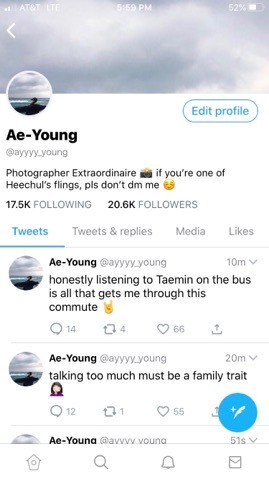

#super junior#super junior series#super junior au#super junior social media au#kpop#kpop au#super junior fic#super junior fanfic#kpop series#kpop social media au#cho kyuhyun#kyuhyun#kyuhyun fic#kyuhyun fanfic#kyuhyun imagine#kyuhyun imagines#kpop imagine#kpop imagines#kpop fluff#kpop angst#super junior fluff#super junior angst#kpop drabble#kpop drabbles#super junior drabble#super junior scenario#kpop scenario#super junior scenarios#kpop scenarios
5 notes
·
View notes